




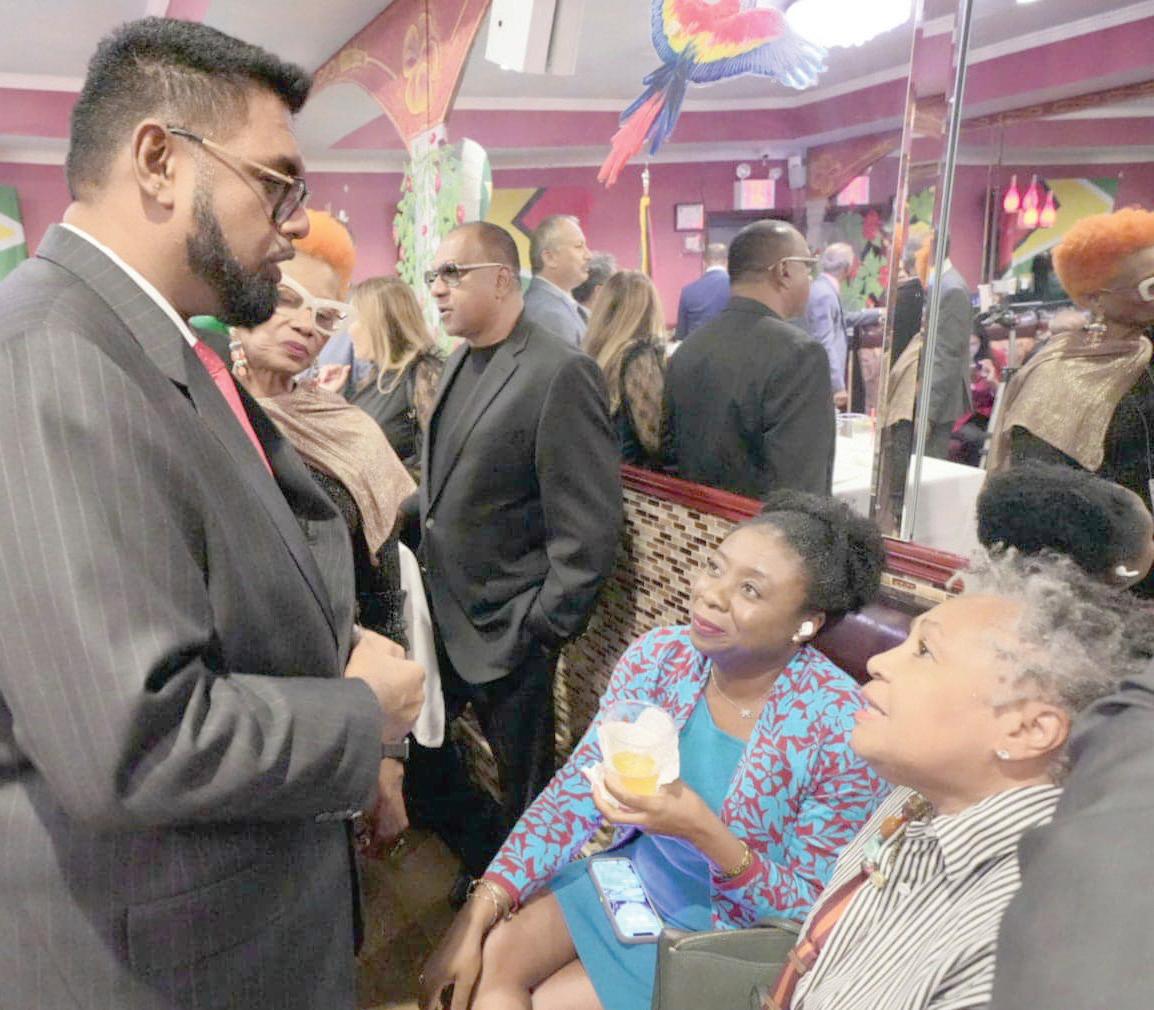
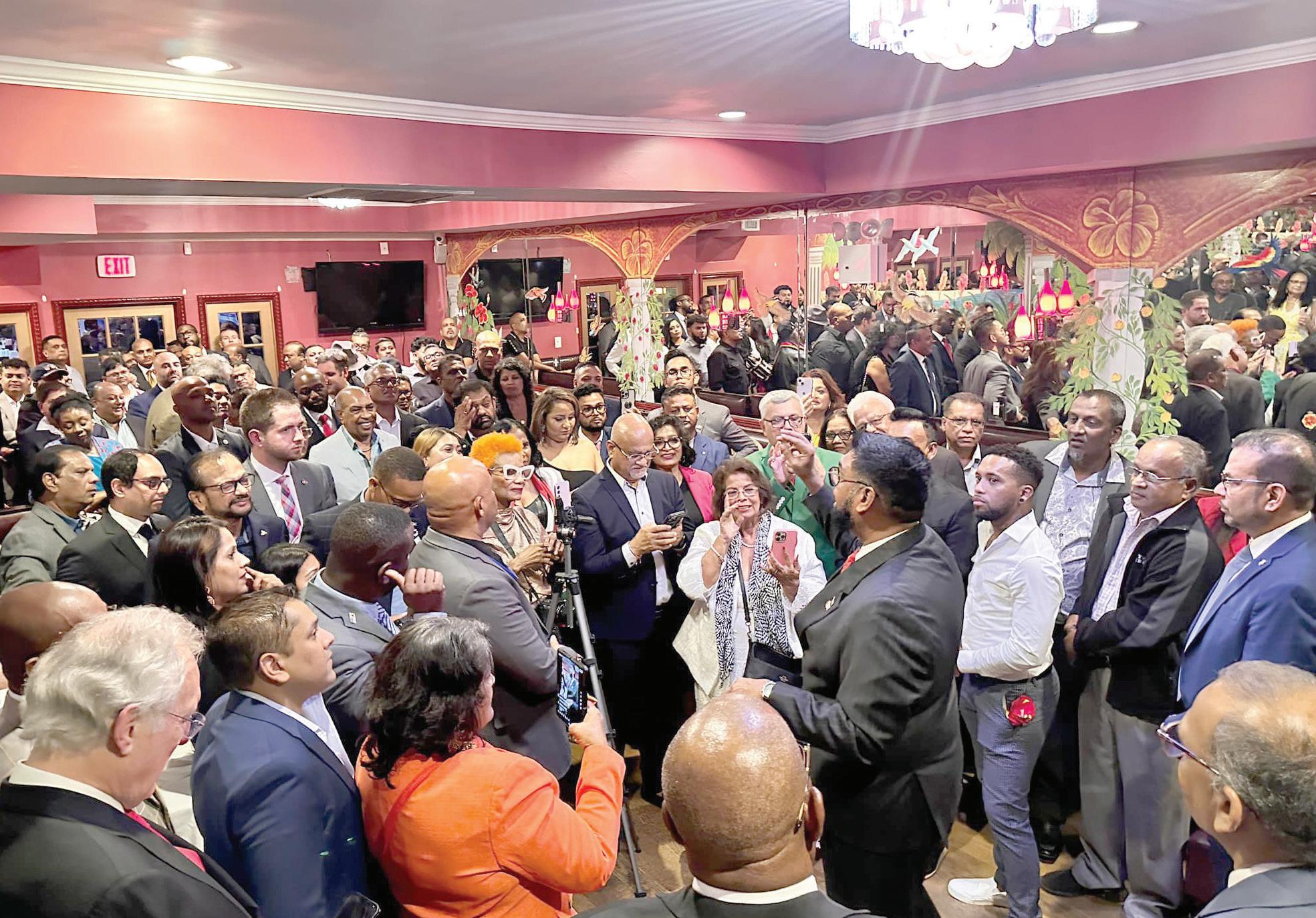

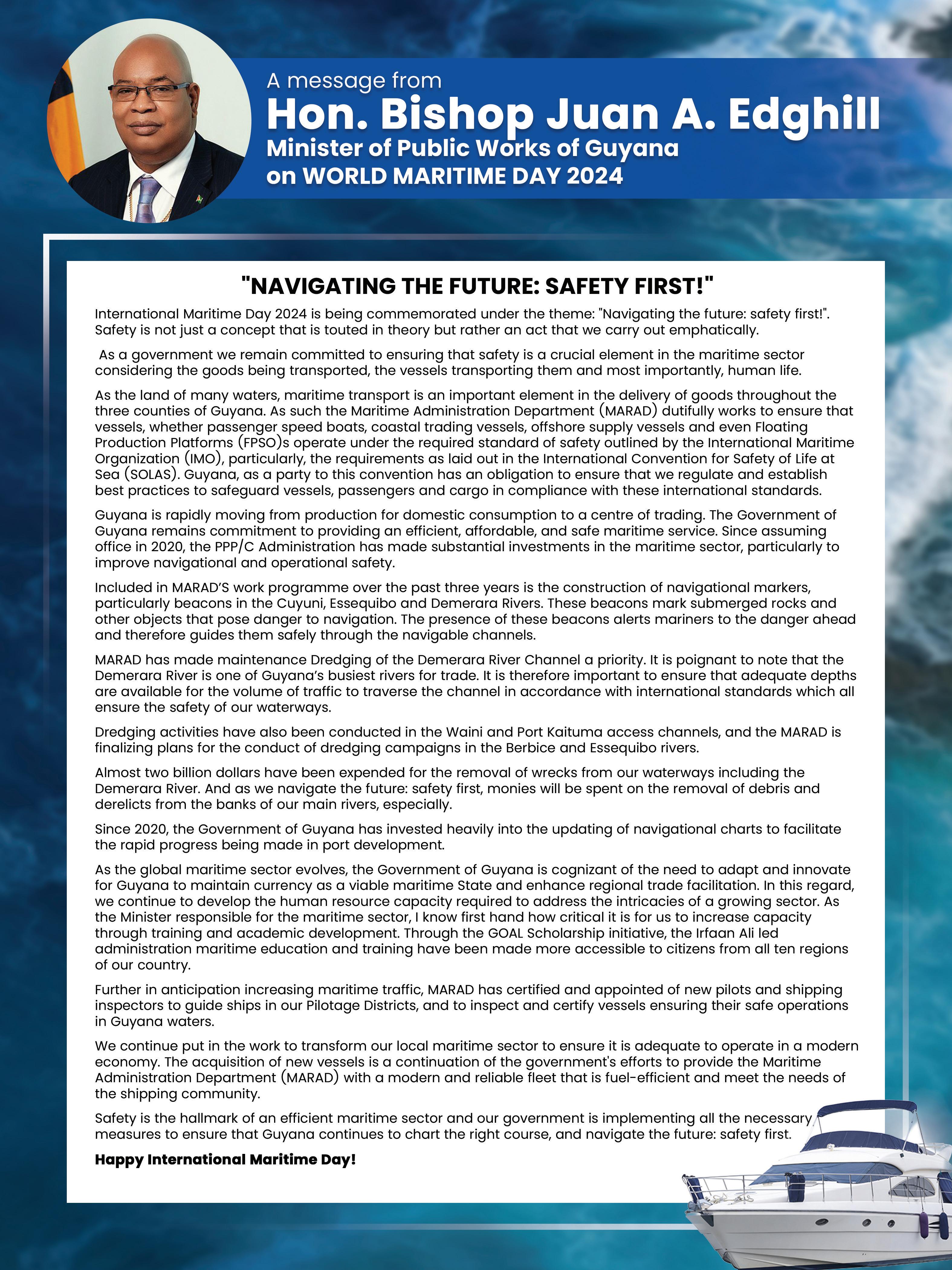
By Naomi Parris
PRESIDENT, Dr Irfaan Ali has said the strict application of international law has been Guyana’s ‘armour and shield’ in the face of aggression fuelled by Venezuela’s territorial claims to the country’s resource-rich Essequibo region.
The Guyanese Head of State on Wednesday joined hundreds of world leaders at the 79th Session of the General Assembly of the United Nations in New York, issuing a call for reformation of the UN’s Security Council.
Dr Ali echoed that the UN is a special responsibility for the security of small states, highlighting that these nations look to multilateralism and the rule of international law to protect them from foreign aggression.
“Guyana is a small state that has had to contend with aggression from the Bolivarian Republic of Venezuela for all 58 years of our nationhood. International law and its strict application have been our armour and our shield in our determination to protect ourselves from this aggression,” the President said.
He reminded the assembly that the border between Guyana and Venezuela was fully, finally and perfectly settled in an 1899 award by an International Tribunal.
“Venezuela was fully represented in that tribunal, whose award it proclaimed in its own Congress and welcomed for more than six decades before reopening the issue on the eve of Guyana’s independence, claiming two-thirds of our territory.”
Guyana brought the controversy, which was once again initiated by Venezuela before the International Court of Justice (ICJ) in compliance with a ruling made by the UN Secretary General and in line with a stance to resolve the matter amicably and legally.
And following intensified acts of aggression by Venezuela, the ICJ in 2023 issued provisional measures : “
Pending a final decision in the case, the Bolivarian Republic of Venezuela shall refrain from taking any action which would modify the situation that currently prevails in the territory in dispute, whereby the Co-operative Republic of Guyana administers and exercises control over the area.”
This newspaper had previously reported that the President of the International Court of Justice (ICJ), Judge Nawaf Salam had convened a crucial meeting with representatives of Guyana and Venezuela to discuss the next procedural steps in the ongoing controversy over the Arbitral Award of October 3, 1899.
Leading Guyana’s delegation was Attorney General and Minister of Legal Affairs, Anil Nandlall, SC, MP; Agent for Guyana at the ICJ, Carl B Greenidge; Philippe Sands and Pierre D’Argent, Legal Counsel; and Lloyd Gunraj, Chargé d’Affaires at the Embassy of Guyana to the Kingdom of Belgium.
Samuel Reinaldo Moncada Acosta, the Agent for Venezuela to the ICJ, led the Venezuelan team, which included a delegation and legal advisers.
Guyana’s Attorney General had explained that the focus was on the necessity and timing of a second round of written pleadings, following Venezuela’s submission of its Counter-Memorial on April 8, 2024.
During the meeting, both nations agreed that additional written pleadings were required to advance the case. Guyana suggested a six-month period from the date of Venezuela’s Counter-Memorial submission, setting an initial deadline of October 8, 2024, for its reply.
However, Guyana expressed flexibility in extending this deadline to late October, contingent upon the court’s schedule.
Venezuela, on the other hand, requested a 12-month period from Guyana’s October reply to prepare its rejoinder, citing
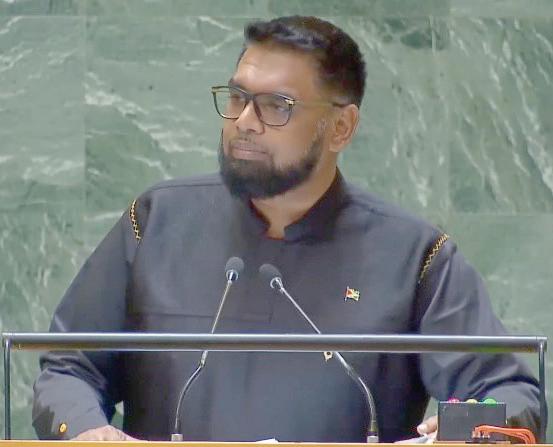
the complexity of the case
President Ali, on Wednesday, noted that he welcomed its western neighbour’s participation in the court.
“We welcome Venezuela’s decision to participate in the court’s proceedings, and express the hope that Venezuela will accept the decision of the court, as Guyana has long pledged to do.”
He pointed out too that Guyana’s stance remains one that is supportive of the rule of law.
“I reaffirm Guyana’s unwavering commitment to a peaceful resolution of this long-standing controversy in full conformity with international law and the principles set forth in the United Nations Charter.”
The genesis of the border controversy goes back to the 1899 Arbitral Award, a landmark decision that delineated the boundary between Guyana and Vene -
zuela.
Despite the historic arbitration, tensions have persisted, with Venezuela repeatedly challenging the validity of the award.
In 2018, Guyana took a decisive step by approaching the ICJ, seeking affirmation of the award’s legitimacy.
Venezuela initially claimed that the ICJ lacked jurisdiction, a contention flatly rejected by the World Court in a crucial ruling in December 2020. The door was thus opened for the ICJ to delve into the merits of the substantive case.
Lawmakers aligned with Venezuelan President Nicolas Maduro have approved the creation of a new state “Guayana Esequiba,” in Guyana’s resource-rich Essequibo region.
Venezuela, last year, had intensified claims to two-thirds of Guyana’s Essequibo region.
–– project is currently 80 per cent complete
MINISTER within the Ministry of Housing & Water, Susan Rodrigues, along with Member of Parliament, Faizal Jaffarally and Guyana Water Inc. (GWI) Regional Manager, Heralall Darsan, on Tuesday, visited the Cotton Tree water treatment plant in Region Five to evaluate the ongoing upgrade works.
Following their inspection, Minister Rodrigues announced that the project 80 per cent complete and was on track for completion by the end of the year.
“We are investing just over $400 million in the upgrade of this water treatment
plant, which is all part of our larger objective of ensuring that, by 2025, we provide 90 per cent treated water coverage to the coastland,” she stated.
The Minister emphasised GWI’s strategic plan for Region Five, which aims to deliver 100 per cent treated water to the coastland. The plan includes the ongoing upgrades at the Cotton Tree facility, expansion of transmission and distribution lines, and the construction of a new $2 billion water treatment plant at Bath.
The construction of the new facility, funded by the Caribbean Development Bank (CDB), is set to begin soon, with an
18-month timeline for completion. It is expected to serve approximately 43 per cent of the region’s population. Additionally, the strategic plan includes the installation of small water treatment systems (inline filters) in about eight communities, including Ithaca, De Hoop, and Strath Campbell.
During her visit, Minister Rodrigues also stopped by GWI’s Regional Office at Fort Wellington, where she engaged with both staff and customers. Opened in 2022, this office has significantly enhanced GWI’s operational capacity and improved the working environment. The Minister praised the staff for their commitment to enhancing the region’s water supply and encouraged them to continuously improve
service efficiency. Furthermore, Minister Rodrigues inspected the construction of the new Regional Housing Office located within the GWI compound. This new facility aims to expand the Central Housing and Planning Authority’s (CH&PA) operational capacity, as the agency is currently housed in an office within the Regional Democratic Council compound, making the new office a crucial upgrade for their operations.
Minister Rodrigues’ visit underscores the government’s commitment to improving water treatment and delivery systems across Guyana, ensuring that communities have access to safe and reliable water services.
By Naomi Parris
DESPITE oil production, Guyana remains committed to preserving its forest and biodiversity. In fact, the country aims to double protected areas for biodiversity by 2025. This is according to the country’s President, Dr. Irfaan Ali.
Dr. Ali, during an engagement with the New York Times’ Climate Forward, said that Guyana reserves the right to explore and develop all of its resources, noting that the country’s focus on fossil-fuel extraction does not contradict its efforts to combat climate change.

“The story of Guyana today is one in which oil and gas may dominate the agenda but, really, forest biodiversity and our contribution to climate change, our positive contribution to climate change and keeping the planet alive, are the real story of Guyana,” the Guyanese Head of State said.

President Ali posited that Guyana could be the leading producer of energy around the world, even in the post-2050 era when countries are expected to no longer embrace the production of fossil fuel. He pointed out, too, that Guyana would remain carbon sink. The country boasts a forest coverage of 86 per cent that stores 19.5 gigatons of carbon; it must also be noted that Guyana has adopted a low-carbon development strategy le-
veraging its forests to earn carbon credits, benefitting indigenous communities.
“We have kept this forest alive. We have pulled on a lot of other competing opportunities that one could have had for the country by keeping the forest standing alive. The world today would have lost in the last 50 years more than 50 per cent of our biodiversity globally….Guyana is located in two of the richest biodi-

industry will still have a space in the energy matrix.
In Guyana’s case, revenues earned from the sale of carbon credits and the oil and gas sector are being utilised to implement adaptation measures, drive its energy transition efforts and advance development across the infrastructure, health and education sectors of the country.
versity zones, the Amazon and the Guyana shield… We are making a commitment to the world, not only are we keeping the forest standing alive, but we are also going to keep this biodiversity.”
He keenly affirmed that there is ‘no hypocrisy, nor contradiction’ in the country’s development matrix.
President Ali believes that we all know that petroleum and the petroleum
He stressed that Guyana, like many other developing states, stands at the mercy of the climate crisis and has to find its own financing to implement the necessary adaptation measures that are needed.
“We are very clear as a developing country that we have to find resources. We are below sea level, we have to build sea defenses, to invest in drainage or irrigation structures. No one has given [us] preferential financing for that, or conceptual financing for that. [We] have to find out resources to protect [our] country.

THE government is set to resume international adoptions within a week. In compliance with the Hague Convention, the government has taken steps to ensure the process is handled smoothly and judiciously.
The announcement was made by Minister of Human Services and Social Security, Dr Vindhya Persaud, during an outreach at the Canefield Health Centre in Region Six on Tuesday.
The Hague Convention on the Protection of Children and Intercountry Adoption is an international treaty designed to ensure the safety and regulation of intercountry adoptions.
The government has established the Guyana Cen -
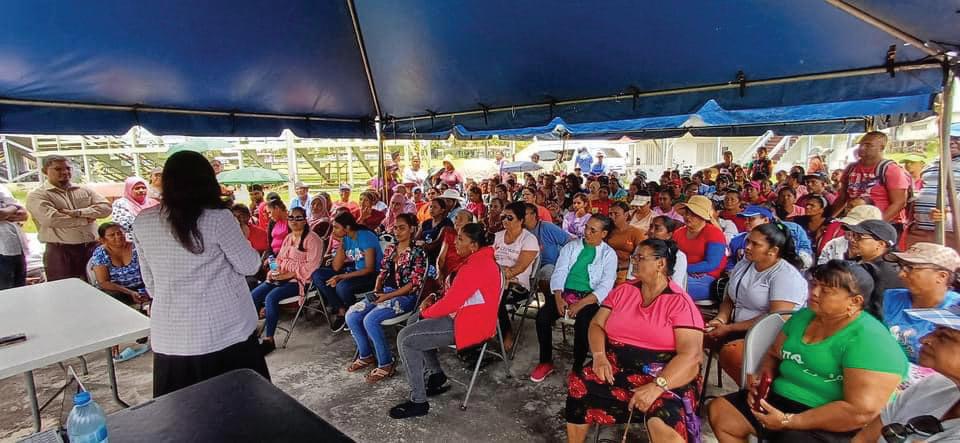
tral Authority in alignment with the recent passage of the Adoption of Children (Amendment) Act 2021. This body will administer the process of international
adoptions and strengthen co-operation with countries that are a part of the Hague Convention on Intercountry Adoption. Its creation also aims to prevent improper
By Naomi Parris
PRIORITISING climate emergency and environmental protection, the Organization of American States (OAS) is concentrating on major climate change projects in the Caribbean, with a particular focus on Guyana, Barbados, and Jamaica.
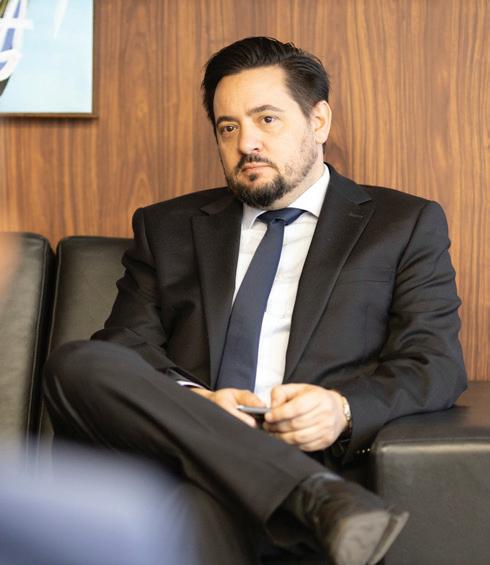
During a recent exclusive interview with the Guyana Chronicle, Javier Palummo, the Special Rapporteur on Economic, Social, and Environmental Rights under the Inter-American Commission on Human Rights of the OAS, explained that while the OAS
works on various aspects related to climate change, the Special Rapporteurship on Economic, Social, Cultural, and Environmental Rights (REDESCA) has taken the lead.
Ultimately, the aim is to provide support to these developing states with a focus on the intersection of climate change and human rights.
“Regarding Guyana specifically, REDESCA has highlighted the country’s efforts in climate adaptation and environmental protection. Guyana ratified the
Continued on page 7
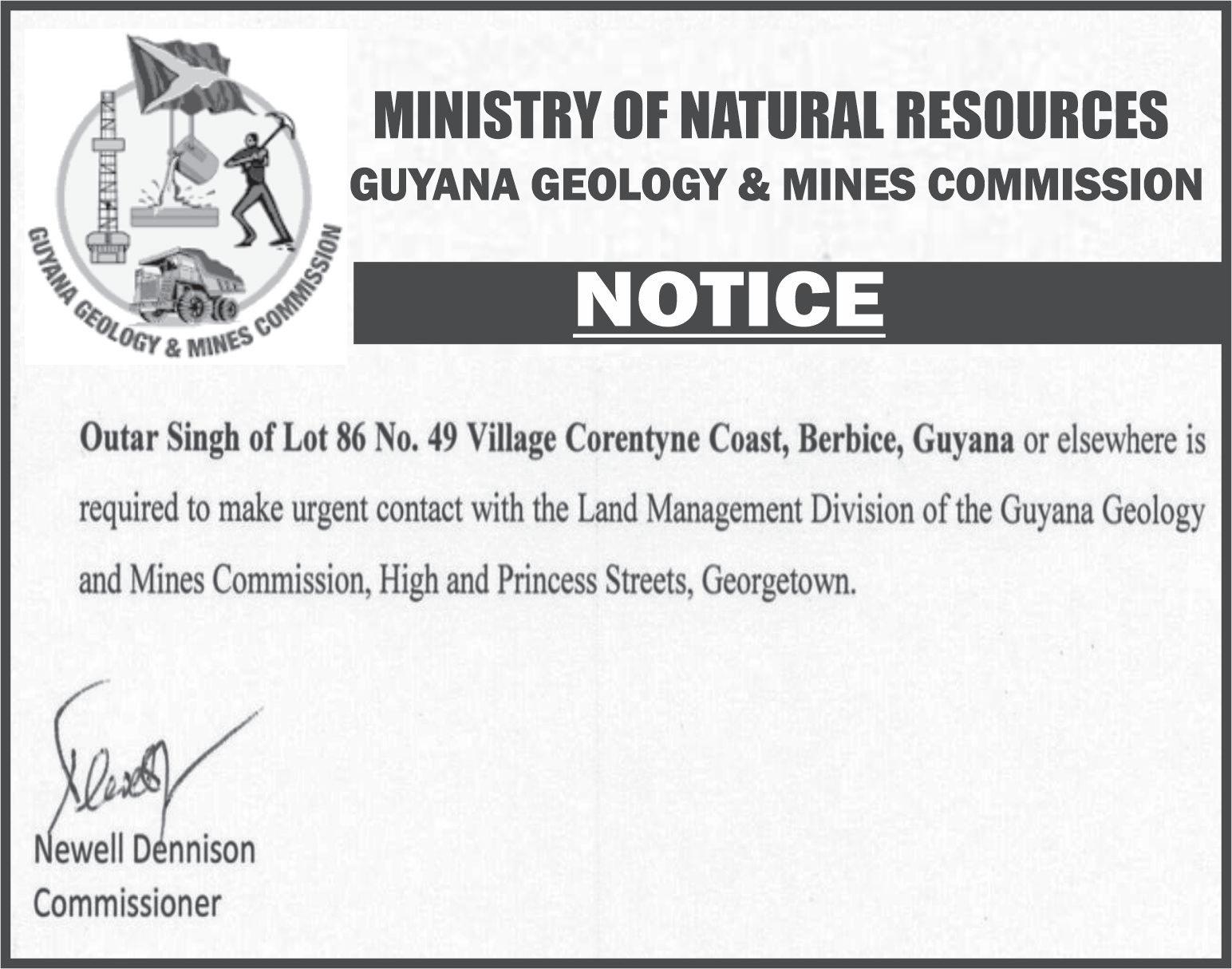
experienced attorney, representatives from the Childcare Protection Agency, officers from the Ministries of Home Affairs, Foreign Affairs and International Co-operation.
Guyana’s move to establish a central regulatory body follows its signing of the Hague Convention on the Protection of Children and Co-operation in Respect of Intercountry Adoption in 2019.
financial gain associated with adoptions.
Minister Persaud will chair the committee which will include six members – an
The establishment of this body ensures that the country’s adoption procedures are aligned with international standards and best practices.
When operational, the authority will follow strict guidelines to manage the intercountry adoption process. This will include rigorous
investigations, home studies, and background checks to assess the suitability of adopting parties, ensuring that the child’s well-being remains paramount.
Those who fail to comply with these requirements will face legal consequences, including fines of up to $500,000 and six-months imprisonment.
Meanwhile, in addition to international adoptions, the Ministry of Human Services and Social Security is expanding its support for vulnerable children, offering foster care and adoption services.
A key initiative is financial assistance of $20,000 per month for orphans and those in foster care. (DPI)
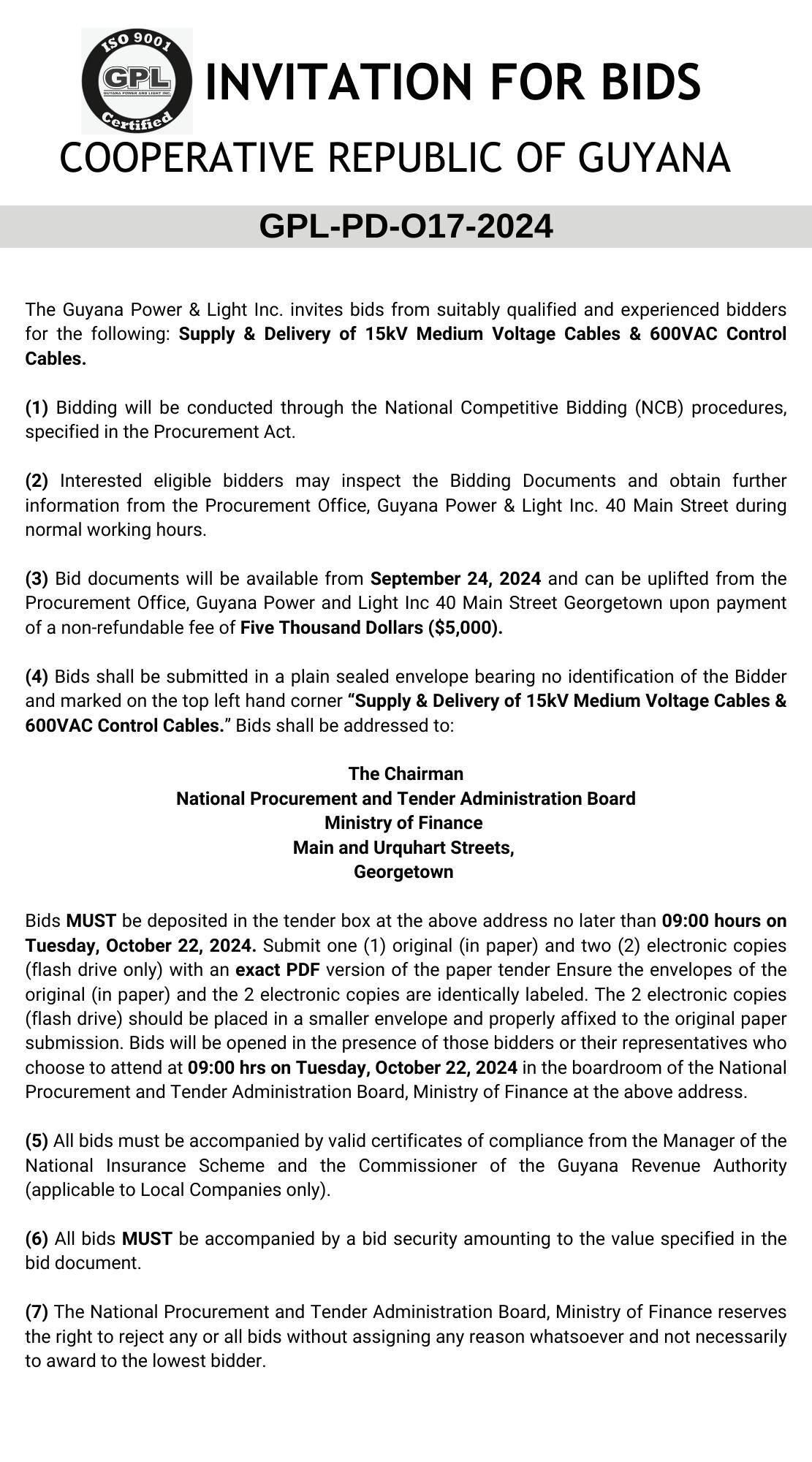

IN a recent high-level meeting, Vice President Bharrat Jagdeo issued a clarion call for strict adherence to procurement regulations within Guyana’s public sector agencies. While his emphasis on transparency and accountability is commendable, it raises critical questions about the systemic issues that have historically plagued public procurement processes in the country.
Jagdeo’s assertion that 95 per cent of public projects comply with procurement rules, while the remaining five per cent is a source of concern, is a testament to the progress
made under challenging conditions.
However, the disproportionate focus on the problematic minority, as he pointed out, often obscures deeper, more systemic failings that warrant scrutiny. This isn’t just a matter of optics; it is about addressing the root causes of inefficiencies and corruption that can tarnish the reputation of public agencies.
The Vice President’s warning against deviations from the Procurement Act, as well as his call for early planning to avoid the rush that often leads to sole sourcing, is an essential step toward improving procurement practices. Yet, the
culture of compliance must transcend mere rhetoric.
The onus falls on agency heads and accounting officers to cultivate an environment where procurement rules are not only known but actively enforced. Jagdeo’s directive that officials will be evaluated on their adherence to these guidelines is a positive measure, but the challenge lies in implementing genuine oversight mechanisms.
Jagdeo’s concerns regarding potential manipulation of the three-quote system and the misuse of restrictive tendering processes cannot be taken lightly. These practices undermine fair competition and open
the door to favoritism. He aptly warned against allowing a few contractors to monopolize bids, which highlights the need for a more rigorous vetting process to ensure equitable access for all capable firms.
Moreover, the issue of corruption, particularly the solicitation of bribes for expedited payments, reflects a pervasive culture that must be dismantled. Jagdeo's condemnation of these practices is necessary, but it must be accompanied by robust measures to protect whistleblowers and ensure that violators face consequences.
The public must be assured that the government
is not merely paying lip service to accountability but is ready to act decisively against corruption in all its forms.
It is also imperative to address the inflated costs associated with contracts due to unnecessary items, as well as conflicts of interest among public officials who simultaneously run private companies.
Jagdeo’s insistence on focusing contracts solely on essential deliverables is a prudent approach, yet the challenge lies in operationalizing this directive. Without vigilant oversight, the temptation to sidestep regulations will persist.
As Guyana prepares for
its 2025 budget, the call for data-driven decision-making is timely. Effective governance hinges on the ability to make informed choices based on accurate data rather than political expediency. This approach not only enhances policy effectiveness but also builds public trust—an essential component for any government aiming to serve its constituents faithfully. However, the fight against inefficiency and corruption is not just the responsibility of a few public servants; it requires a cultural transformation across all levels of government.
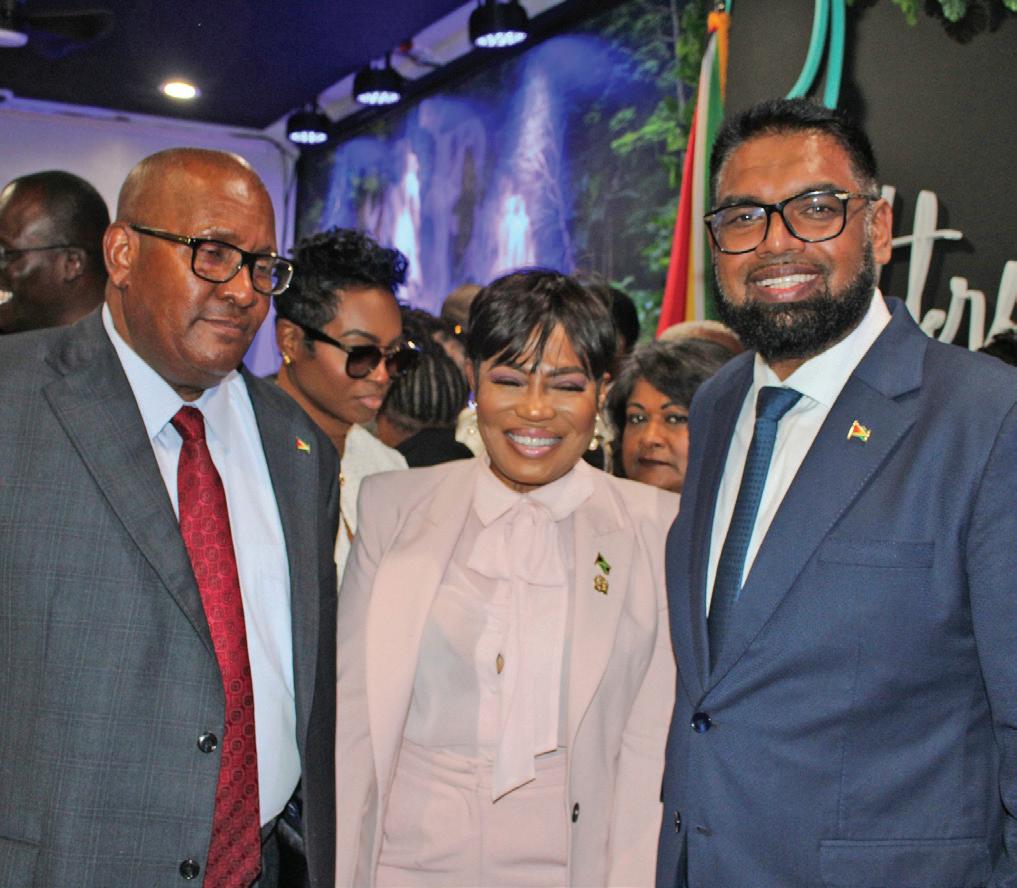
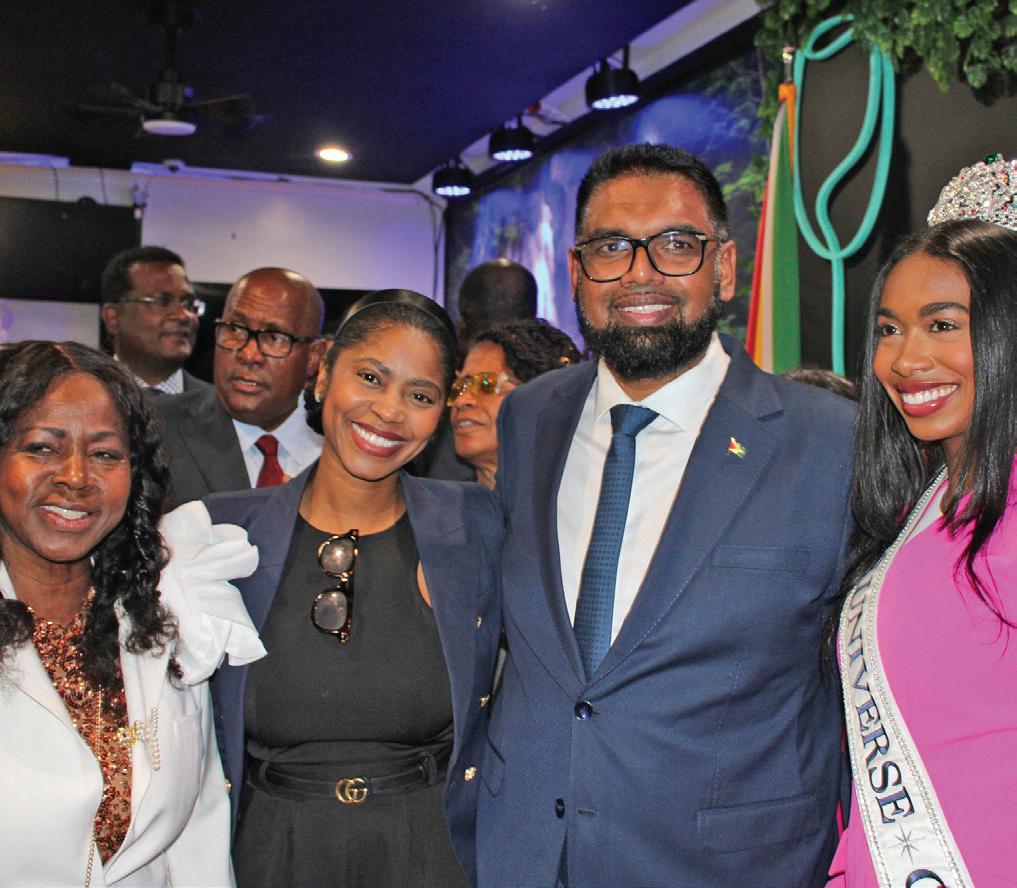
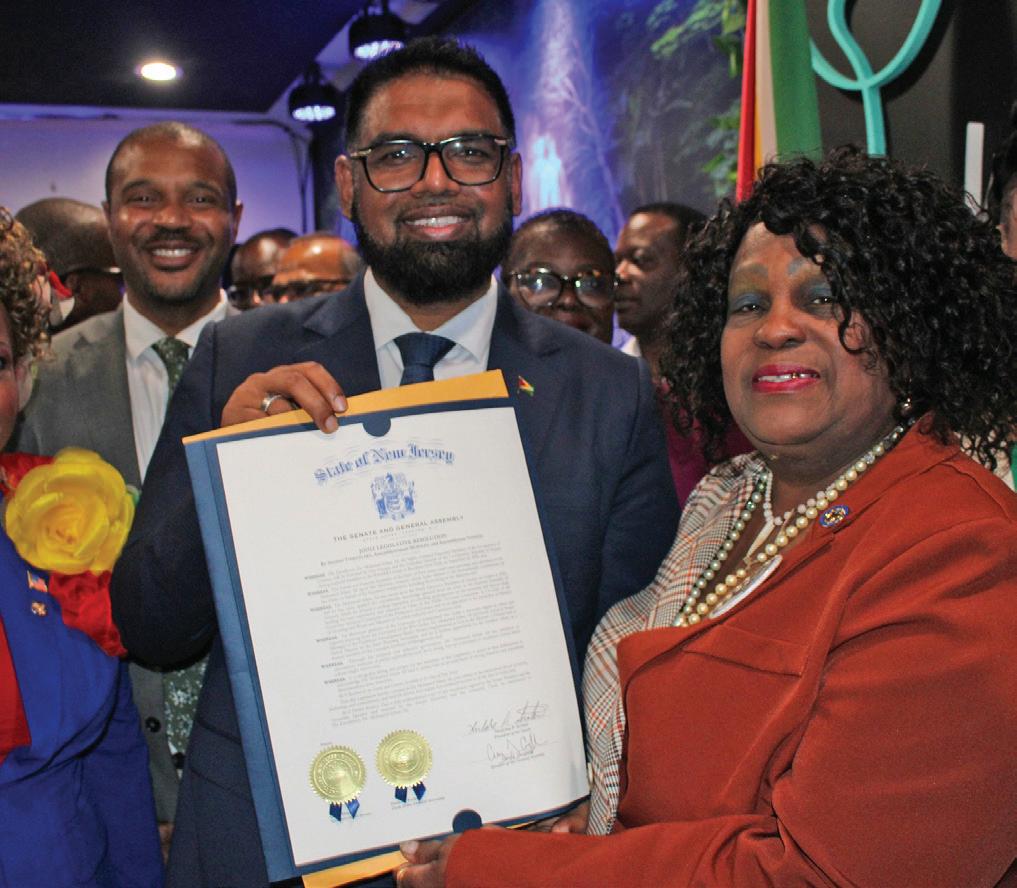
PRESIDENT Irfaan Ali was warmly welcomed in Brooklyn, New York, USA where he attended a breakfast event at Waterfall Lounge, hosted by the gracious Doris Rodney and her daughter. The enthusiastic crowd engaged with the President,
who outlined his vision for Guyana’s development and responded to numerous questions from attendees. During the event, President Ali was honoured with a Senate Resolution from Britnee Timberlake, representing New Jersey’s 34th District. The gathering celebrated his lead-
ership and looked forward to his address at the 79th Session of the United Nations (UN) General Assembly on Wednesday.
Then on Tuesday evening, President Ali attended a social mixer with the Guyanese diaspora at the Hibiscus Restaurant on Jamaica
Avenue, Queens, New York. There, he informed attendees of the transformational infrastructure projects taking place, including the building of roads, hospitals and schools. He also spoke with them about the ‘One Guyana’ platform. Both events were attend-
ed by scores of Guyanese who were eager to learn about the unprecedented development taking place in their homeland.
Accompanying the president was his wife, First Lady Arya Ali.
The Head of State previously visited Brooklyn
in April of this year, where he interacted with Guyanese-owned businesses in the diaspora. President Ali has reiterated that his government’s message is founded on national unity and the collective desire to see Guyana prosper.
— Mustapha tells FAO, highlights country’s efforts to tackle food insecurity
By Naomi Parris
IN making strides to reduce hunger, Guyana has fallen below the regional and global averages for undernourishment, with the country reporting a 2.5 per cent decrease.
The country’s Agriculture Minister, Zulfikar Mustapha, revealed this on Wednesday during his participation in a virtual high-level dialogue: State of Food Security and Nutrition in the World (SOFI 2024) fascinated by the United Nations’ Food and Agriculture Organisation (FAO).
“For Guyana, the fight against hunger is more than a policy goal—it is a moral imperative. We are here today to share our experiences, learn from each other, and renew our collective commitment to eradicate hunger and malnutrition, as outlined in Sustainable Development Goal two.”
According to the SOFI 2024 report, undernourishment in Guyana has fallen below 2.5 per cent, a figure well below the regional average of 6.6 per cent and the global average of 9.1 per cent.
“This achievement has not been accidental, but the result of deliberate policy
interventions aimed at enhancing food production and improving access to nutritious food,” Mustapha said.
The Agriculture Minister further pointed out that the country has made progress in addressing food insecurity according to statistics provided by the official, the prevalence of moderate or severe food insecurity stands at 25.5 per cent lower than the regional average of 31.3 per cent.
Nonetheless, he observed that, while these figures are positive, the country remains at risk of insecurity.
“Our focus remains on ensuring that no one is left behind,” Mustapha said, pointing to the country’s strategic policies that emphasise the expansion of the productive sector and reduction of the Caribbean Community’s (CARICOM) massive food import bill by 25 per cent by 2025.
“This bold plan is driven by the need to enhance domestic production and ensure regional food self-sufficiency. We are expanding agricultural production across several key sectors: crops, livestock, and fisheries/aquaculture.”
Mustapha further highlighted that, while the country is vulnerable to the effects
of climate change, its key policy, the Low Carbon Development Strategy (LCDS) 2030, encompasses plans to build resilience.
“We are building robust drainage and irrigation systems, improving flood control infrastructure, and promoting the use of climate-smart technologies such as shade houses and hydroponics. Guyana has committed over 60 per cent of our agriculture budget to drainage and irrigation.”
Simultaneously, investments are being made to encourage more youth involvement, introduce new crops and promote public-private partnerships.
“We are driving innovation in agriculture, not just for Guyana, but for the broader Caribbean region…it is clear that regional collaboration is key to overcoming the challenges of hunger and malnutrition. Guyana is committed to sharing our experiences and learning from our neighbours. The issues we face—from climate change to economic volatility— have significant regional implications, and our solutions must be regional as well,” the Agriculture Minister said.
From page 5
Escazú Agreement, becoming the first country to do so, and has made significant strides with its Low Carbon Development Strategy [LCDS] 2030, which prioritises ecosystem services and clean energy investments,” Mr. Palummo said.
Through REDESCA, strategic initiatives have been deployed as part of a 2024-2026 work plan that prioritises climate emergency and environmental protection.
Mr. Palummo, however, noted that although Guyana has made significant strides with its LCDS to address the increasing threats of climate change, the country, and peoples are still extremely vulnerable.
“The country also faces significant climate-related challenges, including vulnerability to flooding and sea-level rise, as well as concerns over indigenous land rights due to the expan-
sion of extractive industries, among other aspects documented in the Guyana chapter of our Annual Report.”
Guyana’s LCDS was birthed to give cognisance to the importance of tropical forests in the equation of climate change.
According to the country’s President, Dr. Irfaan Ali, the LCDS has evolved from a vision to a global policy that has set the benchmark for driving action.
The LCDS was first launched in 2009 intending to map out the path of a new growth trajectory in a non-polluting way. The first draft of the policy had set out an initial view on how this might be done, and outlined insights on how to stimulate the creation of a low-deforestation, low-carbon, climate-resilient economy in Guyana.
REDESCA
The Inter-American Commission on Human Rights (IACHR) established
the Office of the Special Rapporteur on Economic, Social, Cultural, and Environmental Rights to spearhead the Commission’s efforts in this domain and to enhance the promotion and protection of these rights throughout the Americas.
The Special Rapporteur further pointed out that one significant initiative is the ongoing process to issue an Advisory Opinion on state obligations in the context of the climate emergency, which was discussed in historic hearings by the Inter-American Court of Human Rights with the participation of REDESCA.
“This process is expected to produce crucial legal standards on how states should address climate change while ensuring human rights, particularly focusing on the protection of vulnerable populations most impacted by the climate crisis,” Mr. Palummo explained.

IN my long columnist career, I cannot remember the times I have written about the foolishness and tragedy that accompanied such a silly mentality of young men who own large motorcycles and believe Guyana is like large countries like the US and Canada where you can open up and ride at a fast fate, feel the wind in your hair and the thrill all over your body.
Such young men who felt like that have died over the past 40 years in Guyana and in large numbers. I have seen a couple of those accidents. The last one was at the junction of the East Coast Highway and Sherriff Street, right at the junction. The motorcyclist was almost beheaded. I won’t describe the body I saw because discretion prevents me.
You cannot go full throttle on your bike because our highways cannot accommodate such
high-speed riding. Our highways evolved out of the villages along the East Coast, East Bank of Demerara and West Coast of Essequibo. It is unbelievable ignorance for any motorcyclist not to know from Vreed-en-Hoop to Parika; from Subryanville to Moleson Creek; are all areas of thriving population centres and there are no long miles of deserted highways where you can enjoy the thrill of speed. It is risk going through hundreds of villages at high speed; you will encounter cyclists, animals, and people.
The point so far is that Guyana’s highways are where people live. When you modify your motorcycle exhaust, and rev it up at 1 AM, you are going to disturb thousands of sleeping humans. This is what has been happening outside Movie Towne at midnight on Fridays, Saturdays, and Sundays.
This has been going on for more than a year now and there has never been one traffic cop in sight.
Here is what these motorcyclists do. They start from outside MovieTowne onto the Railway Embankment and turn from Ogle and come back to MovieTowne. The noise from the modified exhaust wakes up the folks living from Pattensen to Ogle on the Railway Embankment. For months now, a man modified the engine of his car and each weekend at around midnight, he drives from Movie Towne to Ogle and back on the Railway Embankment and the vehicle, designed to make a screeching sound, gives off unbearable noise
This country has a small population and every aberration or scandal Georgetowners hear about. Is the police force saying that they don’t know about the screeching car and the motorcycle gangs
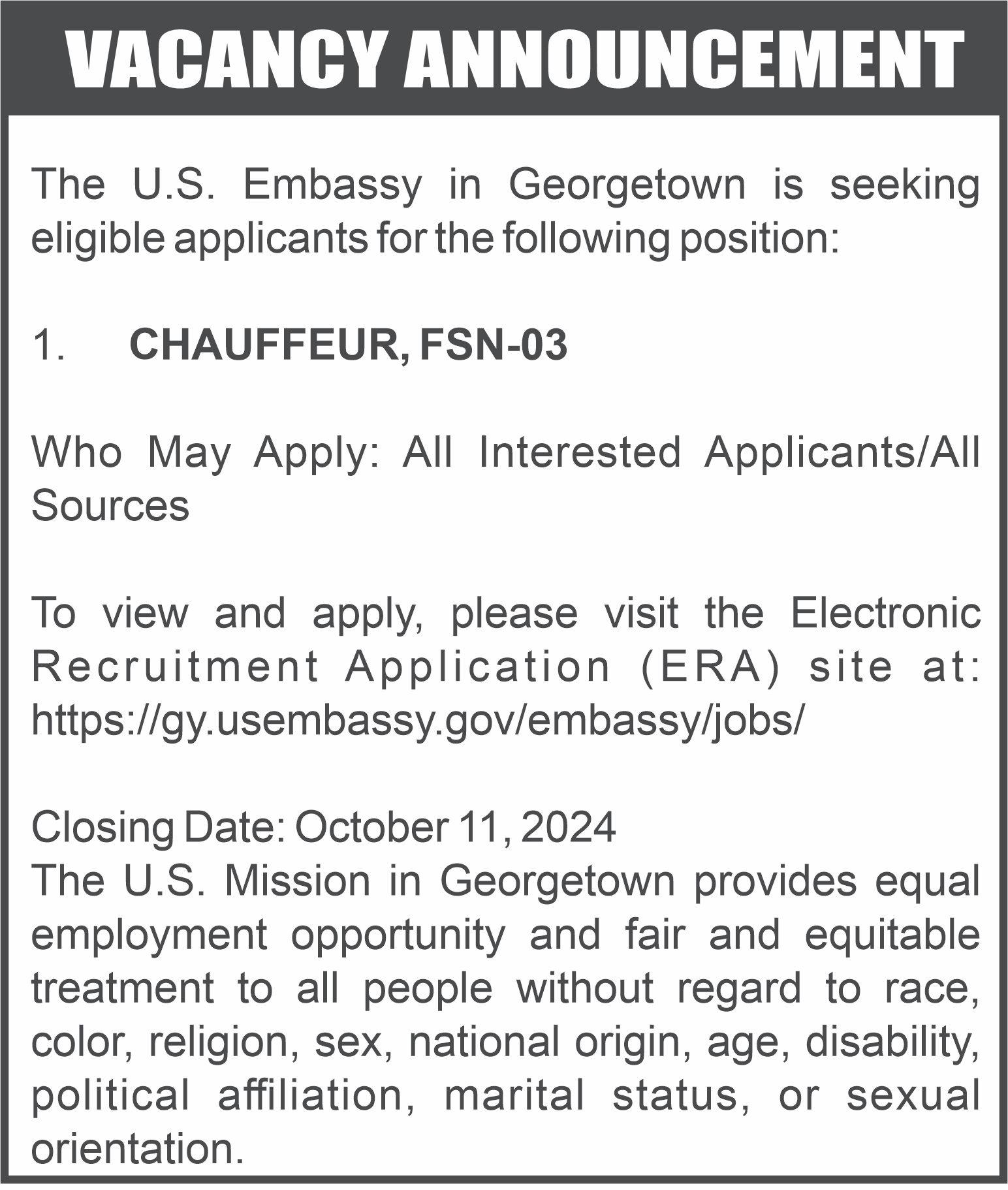

outside MovieTowne on the weekends? None, not one of those cyclists has a helmet on. It forces you to ask the question - where are the traffic cops in the night-time?
I go to the National Park each morning and you cannot miss the traffic ranks on the highways. Each morning I see traffic ranks stop the drivers of those heavy trucks; sometimes there are heated exchanges. I go to the seawall each afternoon, and when I am returning in the evenings, I never see, let me repeat, I never see a traffic rank on the East Coast Highway between 7 PM and 8 PM.
The Ministry of Public Works has banned heavy-duty trucks from using the Railway Em -
bankment. Since that edict, every night those trucks drive by my home. Here is my theory. The drivers know the ranks are not on that particular highway in the evenings and indeed they are not. My verandah looks directly onto the Railway Embankment.
Here is a dimension of the missing nocturnal traffic ranks that is hard to accept. All the time, and I don’t mean episodically, I see the anti-crime ranks on their motorcycles from Impact Base of the Brickdam Police Station, stopping motorcyclists for not wearing helmets. Many times it would be a husband and wife couple going to work. Of course this is in the day.
If the police want to catch riders without helmets, then they should
go outside Movie Towne in the late hours of the evening from Friday to Sunday, and they will find about 25 motorcyclists riding up and down the Railway Embankment and not one has a helmet on. So you pick on riders in the daytime and when night comes you vanish. I went to speak to the ranks from the Sheriff Security company on duty in the MovieTowne complex. I told them about the loud music from the car stereos in the midnight hour from the parking lot of Movie Towne. I was told that when the ranks approach these people, they become abusive. So where does that leave the cancer of noise nuisance?
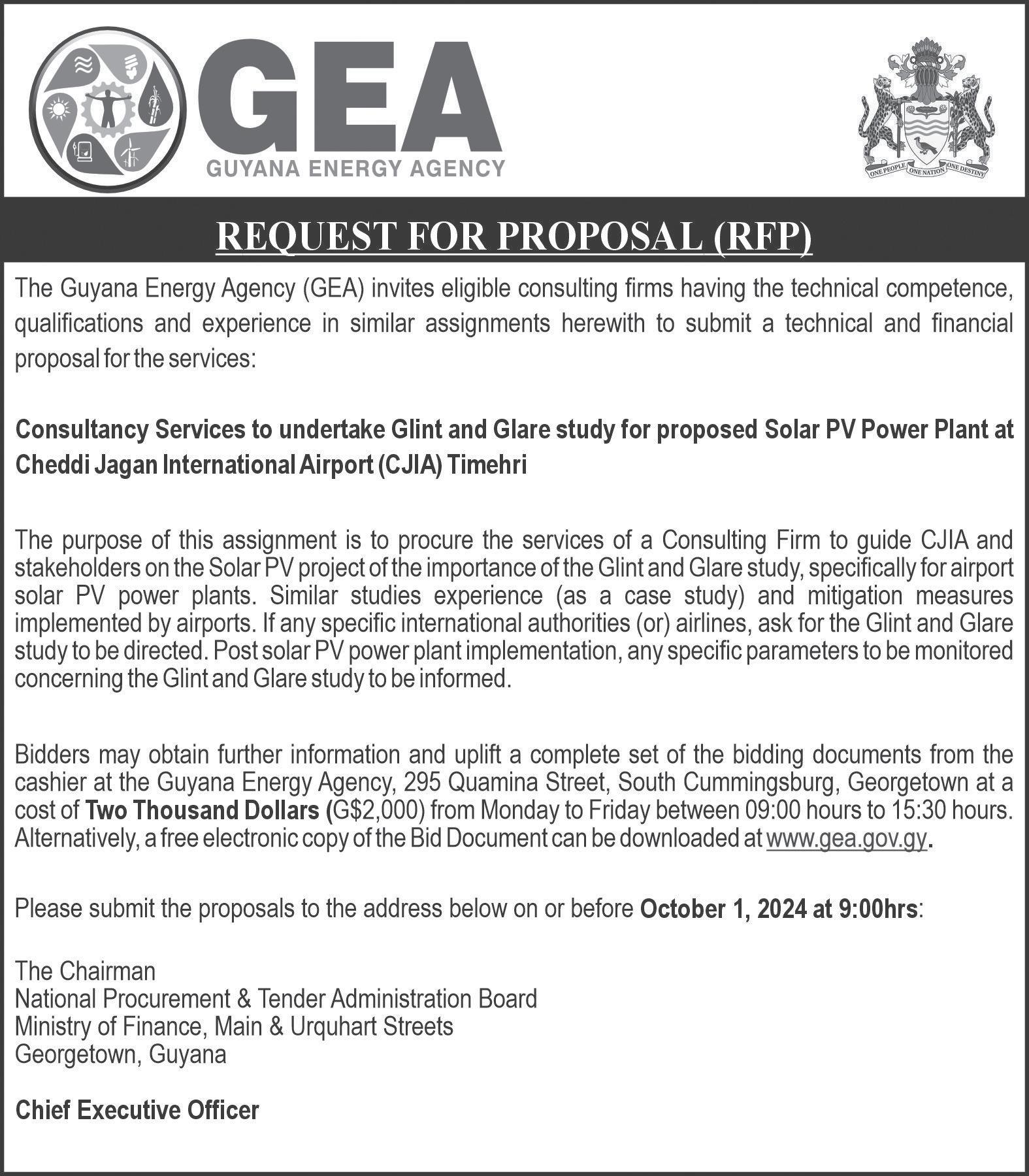
By Indrawattie Natram
MINISTER of Agriculture, Zulfikar Mustapha, has announced that rice farmers in Region Two are experiencing their highest-ever yield in rice production.
This significant achievement was revealed during the commissioning of the Cozier Pump Station, a critical infrastructure project aimed at enhancing agricultural support in the region.
Despite ongoing challenges such as paddy bug infestations, the Minister emphasised that the government’s proactive measures have led to record-breaking results. Rice farmers in Region Two are now harvesting over 40 bags of paddy per acre, marking a historic production of approximately 6.2 hectares—an unprecedented
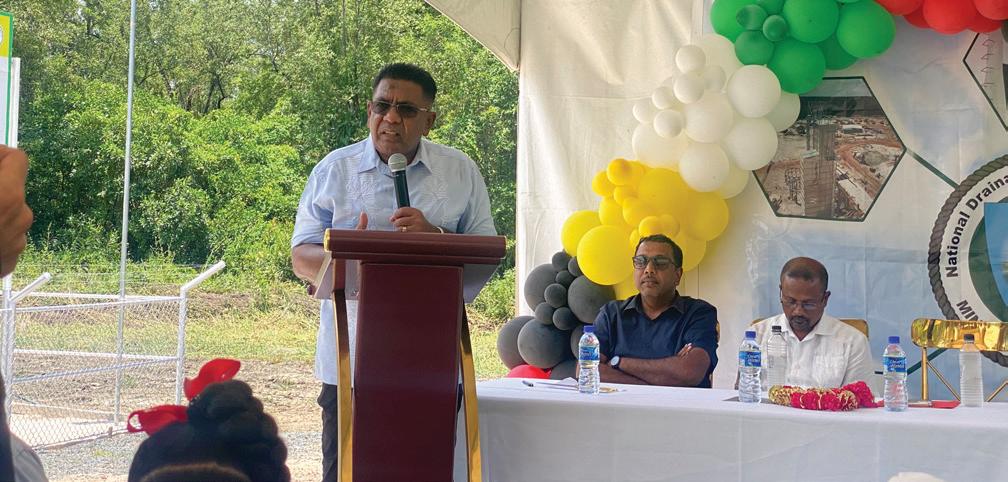
milestone for the region.
Minister Mustapha credited these gains to the strategic investments made by the People’s Progressive Party/ Civic (PPP/C) Government.
“We will continue to invest in the sector. The increase didn’t just happen; it’s a result of the investments made by the PPP/C Government,” he stated.
Over $4 billion has been allocated to strengthen agriculture in Region Two,
with more than $261 million specifically dedicated to rehabilitating the Cozier Pump Station. This pump station plays a crucial role in supporting irrigation and water management for the region’s agricultural lands.
During his address, Minister Mustapha reaffirmed the government’s commitment to the region’s farmers
NEXT week, around 26 households in Plantation Blairmont (Shieldstown), Region Five, will finally receive formal recognition of their property ownership as the Ministry of Housing and Water moves to regularise the area. The announcement was made by Minister within the Ministry of Housing and Water, Susan Rodrigues during a community engagement event held on Tuesday.
Joining her were Member of Parliament Faizal Jaffarally, Regional Chairman Mr. Vickchand Ramphal, and Mr. Gladwin Charles, Director of Community Development at the Central Housing and Planning Authority (CH&PA). The news was met with enthusiasm from residents who have lived in the area for over 30 years without formal documentation.
The process to regularise the land began in 2014, with surveys completed in 2015; however, progress stalled due to a change in government. It resumed under the current administration led by President Irfaan Ali. Recently, the CH&PA secured the Block Title, enabling the processing of titles for verified occupants.
Minister Rodrigues emphasised the importance of
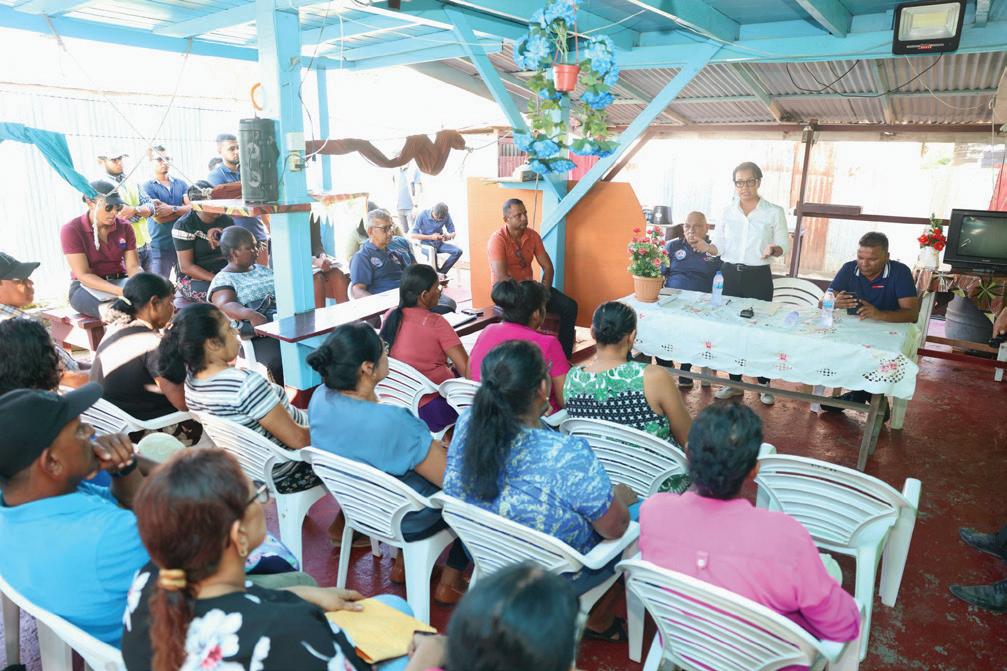
owning land, stating that ownership documents provide a sense of security and the opportunity to pass down property to future generations. She also noted that land titles can serve as collateral for financial purposes, allowing homeowners to invest in property improvements. “You will sign the document right here, and within a few weeks, you will receive your title,” the Minister assured residents. In addition to land regularisation, Minister Rodrigues discussed the government's commitment to addressing squatting in various areas across the country, emphasising a balanced approach that includes relocation when necessary.
During the visit, she also held a meeting at the Cotton
and the agricultural sector at large. He emphasised that the current administration views agriculture as a vital sector, contrary to previous claims that the rice industry was solely a private matter. The government, he noted, has always prioritised the concerns of farmers, making substantial investments to ensure their success.
Minister Mustapha also highlighted the broader transformation of the agriculture sector, attributing this progress to the government’s deliberate investments and initiatives. “The transformation in the agriculture sector is directly linked to these substantial investments,” he said.
The Minister also dis -
cussed Guyana’s regained leadership role in Caribbean agriculture, a position that was lost between 2015 and 2020 but has since been restored under the leadership of President Irfaan Ali. At the first CARICOM Heads of Government meeting in Belize, Guyana reaffirmed its leadership in advancing food security and agriculture in the region.
Minister Mustapha praised President Ali’s contributions, stating, “President Irfaan Ali’s leadership in the Caribbean, particularly in advancing food security and agriculture, is recognised and applauded.” He added that the government remains committed to providing the
necessary infrastructure and support to improve the livelihood of farmers and others involved in the agricultural sector.
As Region Two celebrates this historic yield, Minister Mustapha assured farmers that the government will continue its efforts to address challenges and create opportunities for further growth in the agriculture sector. The commissioning of the Cozier Pump Station marks yet another step towards ensuring that farmers have the resources they need to thrive, positioning Guyana as a regional leader in agricultural innovation and productivity.
Tree Primary School to discuss housing and water-related issues impacting the community. She outlined key developments, including ongoing projects for water treatment plants at Cotton Tree and Bath, which aim to improve water access in the region. Residents were provided with the opportunity to meet with the Minister one-on-one to address their individual concerns, fostering a sense of community engagement and support.
This initiative marks a significant step towards securing property rights for residents of Plantation Blairmont, paving the way for enhanced living conditions and community stability.
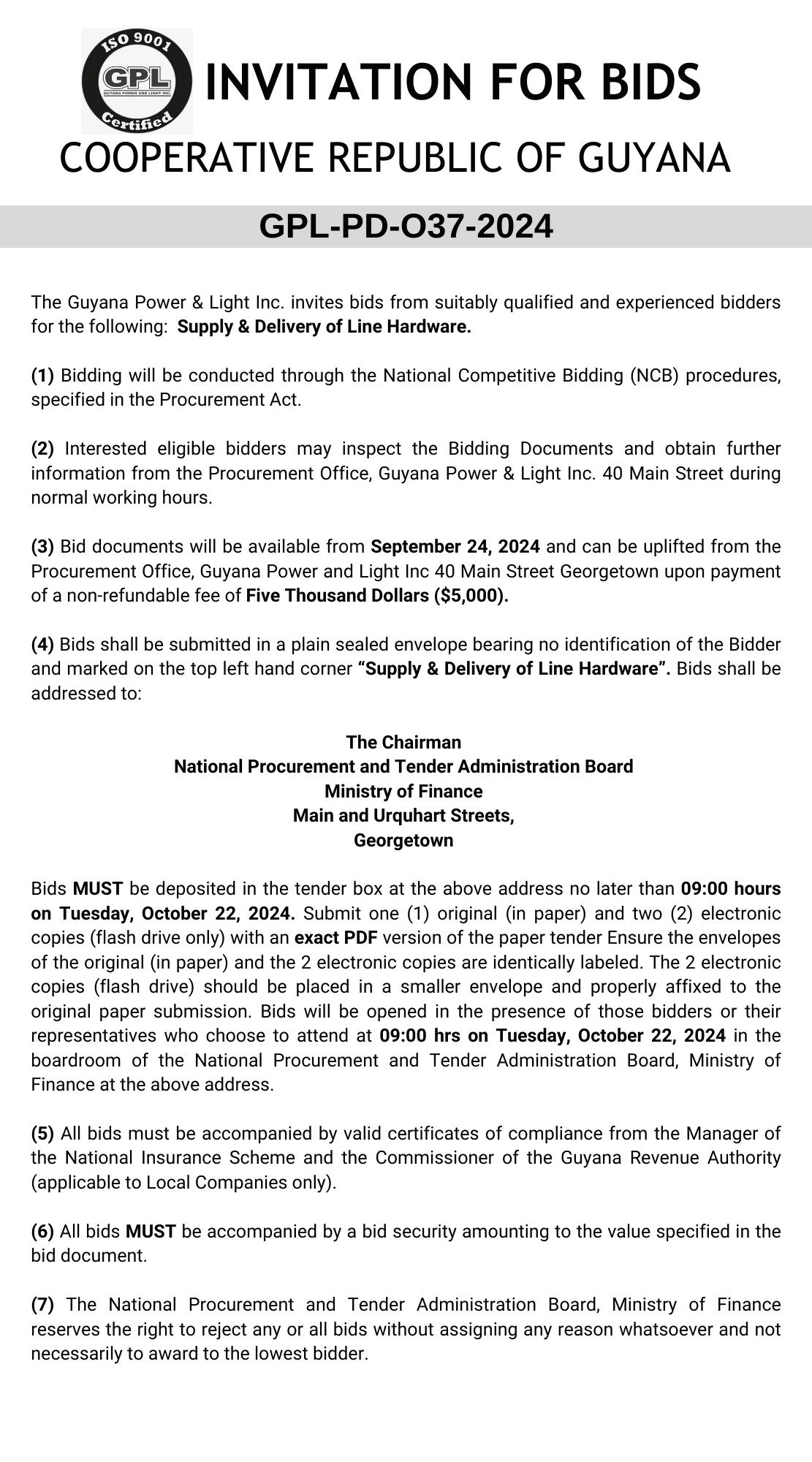
By Feona Morrison
THE critical importance of collaboration between law enforcement agencies and the private sector in addressing trafficking in persons, drug trafficking, and the illicit trade of goods such as alcohol, tobacco, cigarettes, gold, and poultry has been emphasised by Home Affairs Minister, Robeson Benn.
The minister made these remarks on Wednesday while delivering the feature address at the Private Sector Commission’s (PSC’s) Illicit Trade Seminar that was held at the Marriott Hotel in Georgetown.
He pointed out that illegal activities are becoming increasingly sophisticated, presenting new challenges for both local authorities and international partners.
Benn spoke at length about the deep-rooted issues of criminality that have disrupted many aspects of social and economic life, especially in unregulated areas.
He highlighted the growing
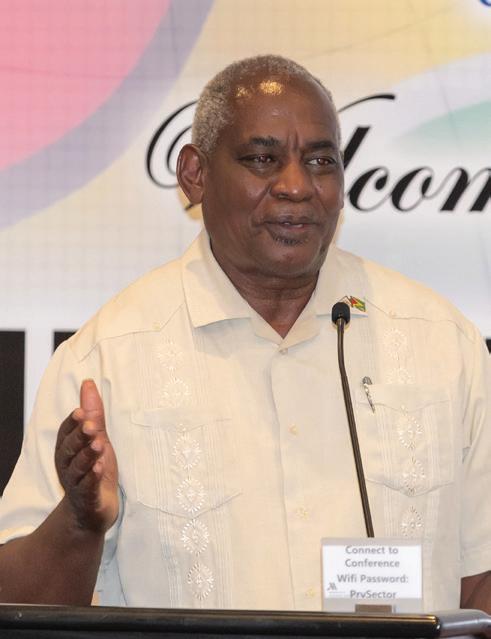
threat posed by transnational organised crime, such as drug trafficking and human trafficking, which have not only destabilised communities but also eroded the integrity of state governance.
“We are in an era of what is now called transnational organised crimes [and] we have new challenges. We talk about the drugs, we talk about the trafficking in persons, we talk about smuggling whether it is chicken or mercury…We have to
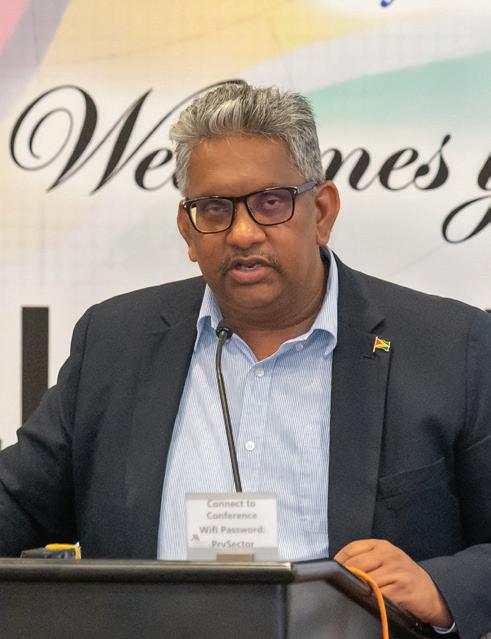
work hard at the level of government itself to make government work…” Minister Benn said to the gathering.
Benn’s comments also focused on the challenges faced by communities in remote areas, where government presence is limited. He stressed the need for better regulation and development in these regions to improve the quality of life and reduce the vulnerability of residents to crime.
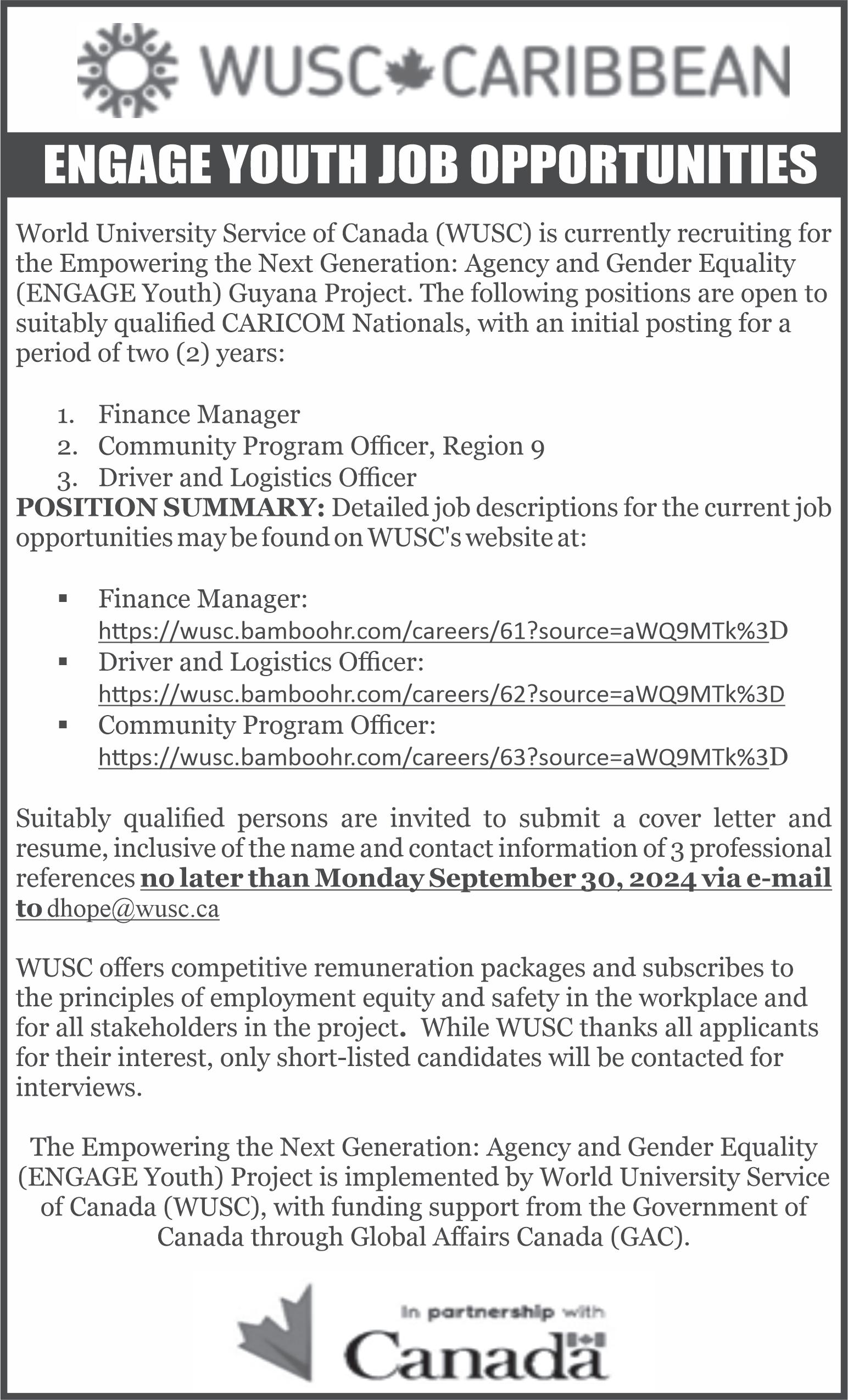
The minister emphasised that solving the country’s societal challenges requires better integration between government agencies, the private sector, and community organisations.
He urged stakeholders to invest in the country’s long-term development and to prioritise sustainable solutions that address the root causes of crime and dysfunction.
In his speech, Benn highlighted the significant financial losses the government suffers because of illegal activities, pointing to smuggling and tax evasion as key factors.
He said, “The revenue loss, in totality to the government, is large. But we have to have a full appreciation of the losses. How will we improve? What are the ways to the improvements in relation to this difficulty? We have to identify why this is a critical issue for our country.” As such, he called for a comprehensive assessment of these losses and the development of strategies to address the issue.
“This [the seminar] for me is a significant opportunity for partnership and the sharing of information. That we point out the areas and we speak with those in law enforcement, some of whom may know who are the usual players in smuggling. That we get to them, that we deal with them. That if they don’t change their ways, they will have to be at the right place [in prison].”
The Home Affairs Minister concluded by welcoming the opportunity for greater partnership and collaboration among various stakeholders to address the country’s growing societal and criminal challenges. He encouraged leaders in both the public and private sectors to commit to long-term efforts to reform the country’s regulatory frameworks and cultural practices.
The minister also placed significant emphasis on the importance of education and training in addressing crime and improving society. “We can make a difference [through] more co-operation, more consultation, wider education on the consequences of this practice.”
Chairman of the PSC, Komal Singh, spoke about the impact of smuggling on businesses and the efforts to combat it through collaboration between the private sector and government agencies.
He highlighted the significant financial losses due to smuggling and the need for immediate measures to stop it. He said the PSC has formed a task force to gather and share intelligence on illicit trade with enforcement agencies. This collaboration, he noted, aims to enhance the effectiveness of enforcement efforts and protect businesses from market share erosion.
“Today is the beginning of a long road ahead of us that we all need to work to drive to make positive change in the industry.
Smuggling cannot continue and collectively, we need to put our heads together to make sure that we find all possible measures and means to make sure we can curb smuggling. The Private Sector Commission stands ready to work with the private sector at large to make sure than we can develop means and measures to help curb smuggling to make sure our treasury and businesses are put in a position where they can be competitive without worrying that smugglers are taking huge market shares…,” Singh added.
In July, the PSC announced that it had established an Illicit Trade Desk (Desk) to address issues related to unfair trading practices, smuggling, uncustomed goods, and counterfeit products.
The desk is housed at the Commission’s headquarters on Waterloo Street, Georgetown. It is open to any member of the public, and complaints can be made in person, by telephone, or by sending an email to the Commission. Once complaints are received, the Commission will forward them to the relevant law enforcement agencies for action.
Persons with information or complaints related to activities they suspect to be illicit trade can contact the Commission via email office@psc. org.gy or on telephone number 225-5347.

By Shaniya Harding
THE communities of Toka and Massara in Region Nine celebrated a historic milestone this week as 20 residents graduated from the Board of Industrial Training’s (BIT) first-ever training programmes in those villages.
The achievement marks a significant step forward in human resource development, with the potential for substantial economic benefits for the Rupununi region.
In Massara, 10 residents— five men and five women— completed the General Buil-
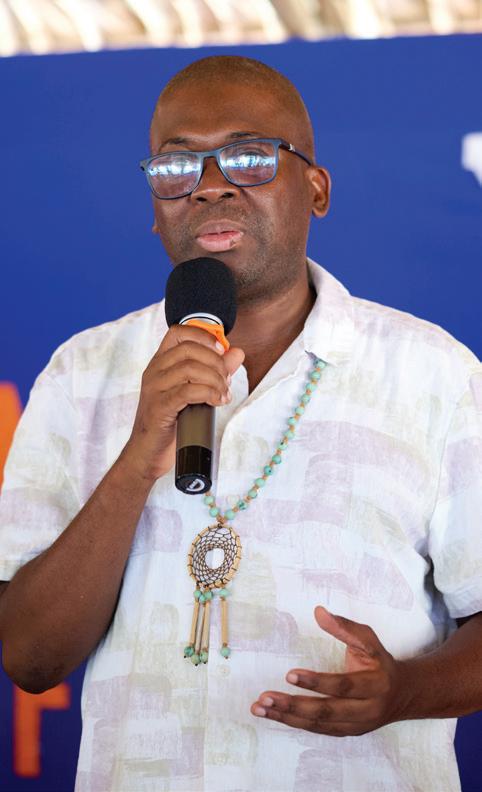
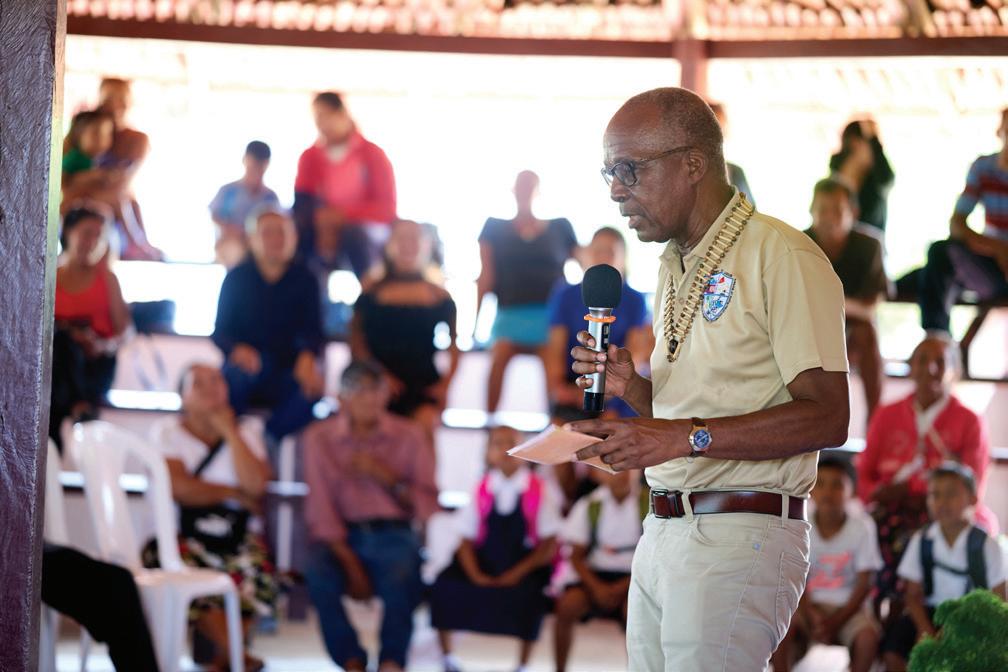

now read drawings and house plans. If someone asks me to build a house, I can read the plans and understand them.”
ding Construction programme, while in Toka, seven men and three women graduated from the Welding and Fabrication course. The training programmes are part of a broader government effort to empower hinterland communities with the same opportunities available to coastal areas.
Minister of Labour, Joseph Hamilton, who delivered the keynote address, emphasised the government’s commitment to ensuring equal access to training and skills development for all Guyanese, regardless of location.
“Whatever opportunities people on the coast have, those same opportunities must come to the hinterland and river communities,” Minister Hamilton stated. He reassured the graduates that the Board of Industrial Training would continue to reach remote areas, adding, “No place is too far, no river is too deep or long, and no place is too high.”
The graduates are now equipped with valuable skills that will reduce the need for external contractors in their communities.
Minister Hamilton noted that the development of local skills was crucial for selfsustainability, particularly in construction and fabrication work, which previously required outside expertise. “Very shortly, when the government is building something in your village, they don’t have to have a contractor come from somewhere else to build it,” he said.
Minister Hamilton also encouraged the graduates to market themselves and their new skills, urging them to use technology and social media to showcase their qualifications.
“You have to market yourself; you have to promote yourself,” he advised, stressing the importance of using their newly acquired skills to benefit both
origins, noting that BIT’s short-term training initiatives, launched in 2005, were designed to meet the immediate needs of the labour sector by equipping people with practical skills.
The CEO expressed gratitude to the government for its continued support in expanding training programmes beyond the coast to hinterland and remote communities. “Thanks to the government, we have the financial support to implement such programmes in these communities,” Maughn said, adding that it was just the beginning of a broader plan to improve the quality of life for Guyanese in all regions.
LIVES AND CREATING OP-
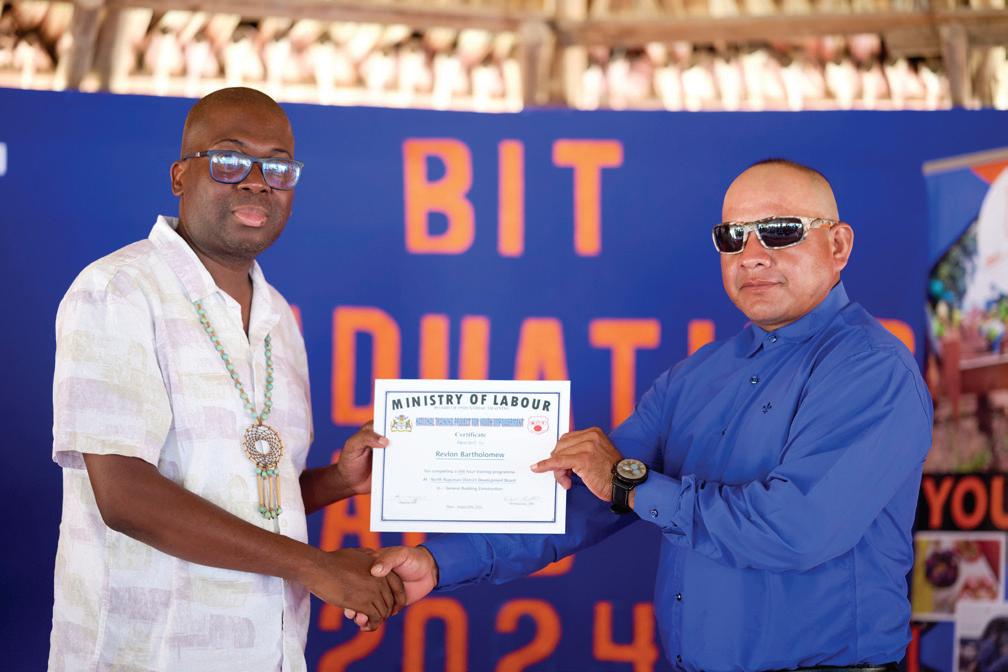
themselves and their communities.
Chief Executive Officer of the Board of Industrial Training, Richard Maughn, also spoke at the graduation ceremony, underscoring the significance of the programme for the entire village. “This is not just an individual achievement, but a village accomplishment,” he said. Maughn highlighted the programme’s
Among the graduates was Revlon Bartholomew from Massara, who previously struggled to find consistent work due to a lack of formal training. “Before, I was just looking for work in the village, but now I can say I have a certificate and know about house plans,” Revlon said. He expressed pride and excitement about his new qualifications, stating that he now has the skills to take on more complex construction projects. “I can
Revlon’s story is just one example of how the BIT training programmes are empowering individuals and transforming communities. As more residents gain the skills needed
for local industries, the Ministry of Labour and BIT are helping to foster economic independence and sustainable growth in the Rupununi.
The successful graduation of 20 skilled workers from Toka and Massara represents a key step in the government’s mission to
develop Guyana’s human resources and uplift hinterland communities. With continued collaboration and support, these initiatives are expected to have a lasting impact on the economic and social landscape of the region.

By Cindy ParkinsonChowbay
AS the newly opened Schoonord to Crane fourlane highway nears a month in service, drivers and commuters are voicing their appreciation for the improved route, crediting President Dr. Mohamed Irfaan Ali and his administration for delivering what many describe as a “much-needed” development for the West Side.
The highway, which stretches along the West Coast of Demerara, has drastically reduced traffic congestion while improving the daily lives of those who rely on it for work and personal travel.
Paul Ignatius, a self-defence instructor and part-time taxi driver from Georgetown, explained how the new highway has not only saved time but also boosted his earnings. Before the highway, traffic was so heavy that taxi drivers like Ignatius could only make a limited number of

trips to and from Vreed-enHoop and other West Coast destinations. Now, he says, drivers can make multiple trips in a shorter time frame, benefitting both customers and themselves.
“I used to refuse jobs on the West Coast because of the traffic,” Ignatius said. “Now, whether I’m on a taxi job or going to fix an AC, I can get back to Georgetown quickly. I want to personally thank
the President for these developments. It’s not just making traffic better—it’s giving us more opportunities to earn.”
Safety is also a major factor in the highway's success. Ignatius praised the new road for being well lit at night, noting that this makes nighttime driving much safer for all users.
Similarly, Jackie Williams, a single mother of two and a babysitter from Blan-
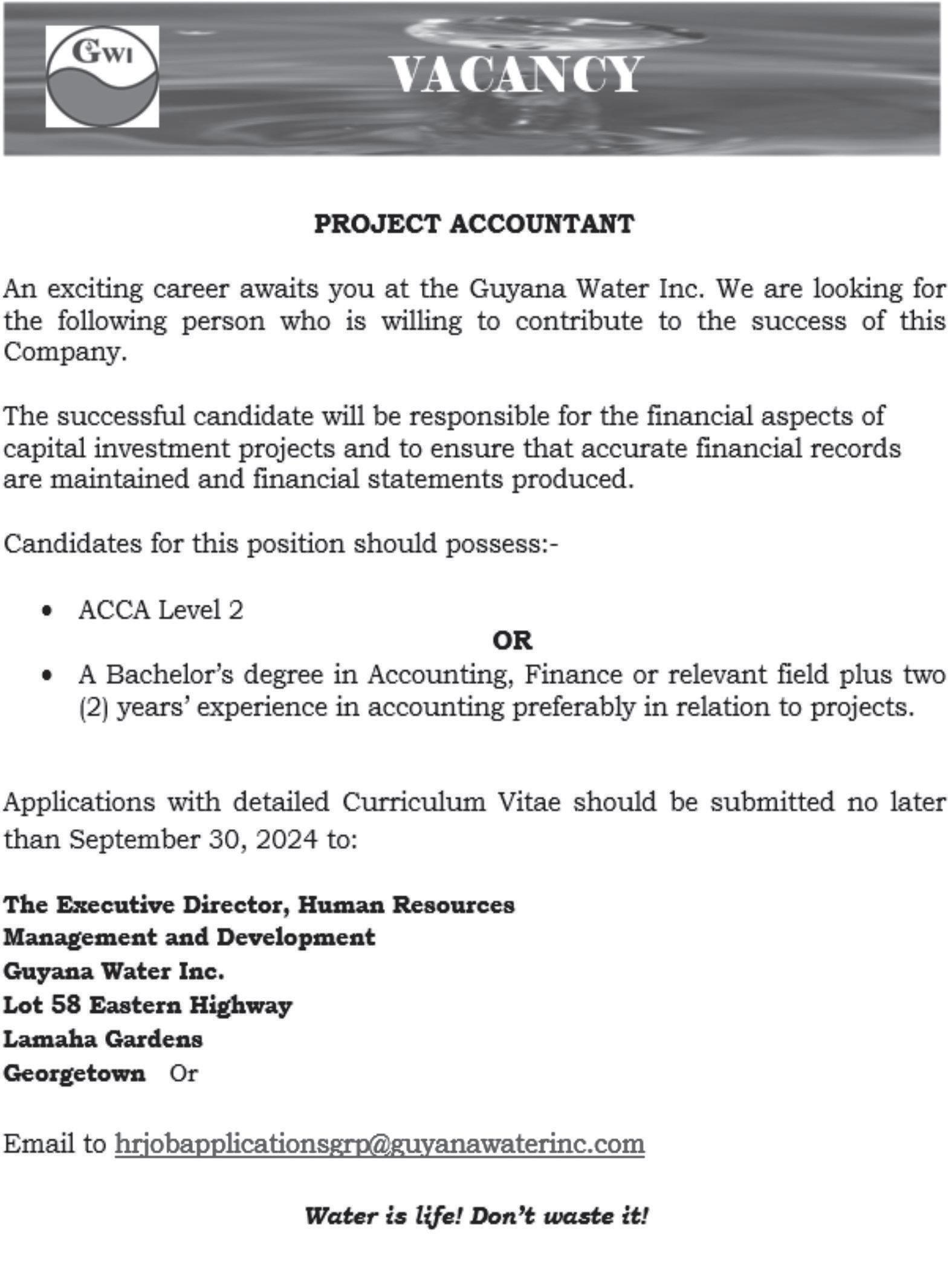

kenburg, shared how the new highway has transformed her daily commute. Working in Providence, she used to leave her home at 05:00 hours to beat the traffic, often missing valuable time with her children. Now, thanks to the quicker commute, she leaves an hour later and still arrives on time for work.
“I love my job, but I was thinking of quitting because of the early mornings and late nights,” Williams said. “Now, I get home earlier and spend more time with my children. This road has saved my job. Thank you, President Ali; you built a road, but you saved my job.”
Williams also mentioned that her child, who recently earned a school placement from CXC exams, now benefits from the faster commute
to school, making their mornings less stressful.
Truck drivers, too, have welcomed the highway’s opening. Mark, a driver from Region Two, frequently travels between Parika, Georgetown, and Berbice. He explained that the long hours of stop-and-go traffic were causing him physical discomfort, particularly leg pain from constantly engaging the clutch and brake. With the new highway, those frustrations are largely gone.
“Driving for 20 years, I’ve seen a lot of bad conditions, and this highway is a big improvement. But I’d like to ask all drivers and pedestrians to use the road more responsibly,” Mark said. “It’s sad to see reckless behaviour. These roads are great, but we need to practise safe driving
and work together to make the roads better.”
Mark urged drivers to remember the “five Cs” of road safety—care, caution, consideration, courtesy, and common sense—and called on the Guyana Police Force to hold accountable those who drive irresponsibly.
As commuters continue to adapt to the new highway, the consensus is clear -- the Schoonord to Crane route has not only alleviated traffic and improved convenience, but it has also made a tangible difference in the lives of many. With continued responsible use, this major development promises to further enhance the quality of life for residents and commuters across the West Coast of Demerara.
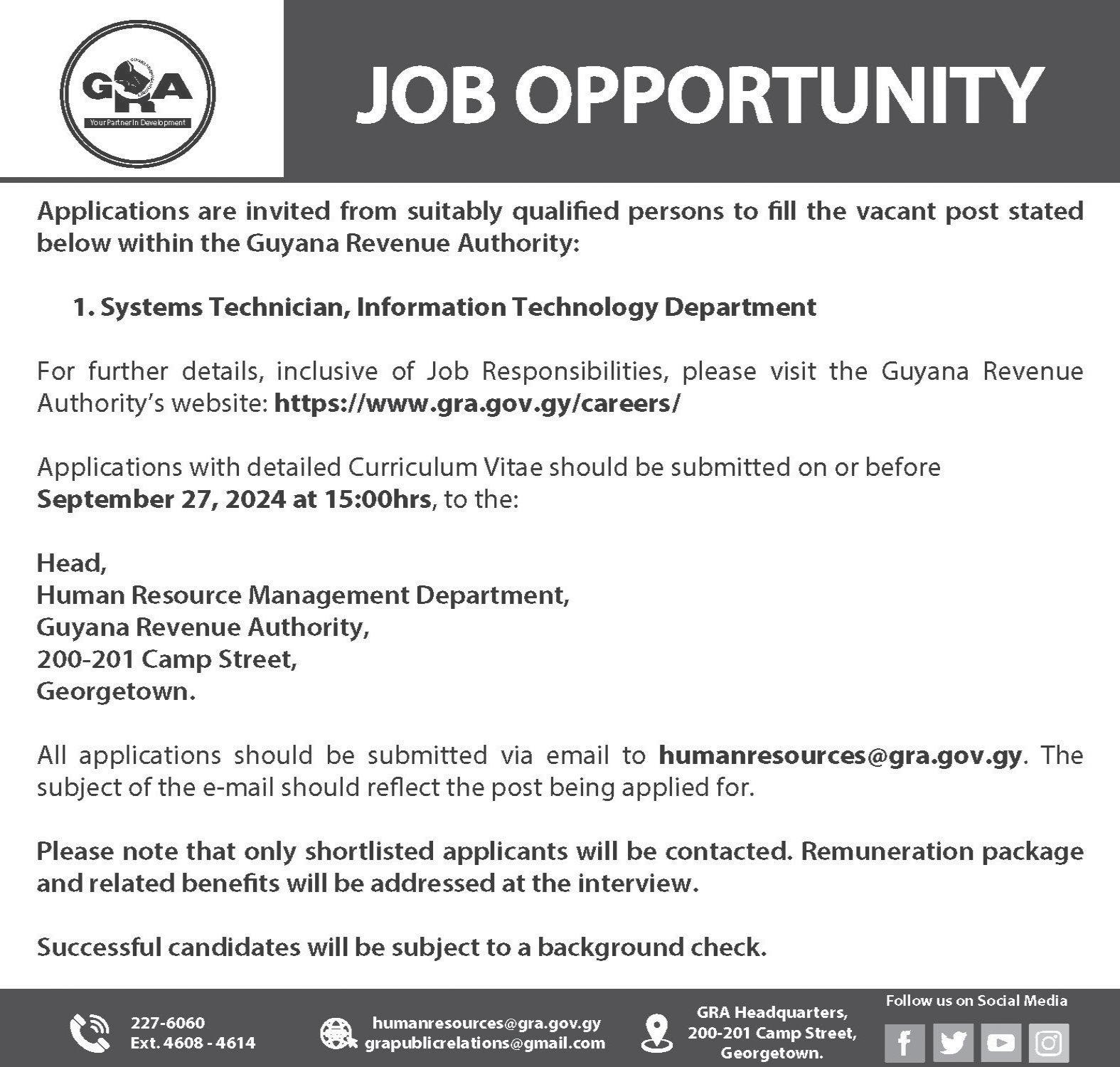
IN a prompt and coordinated response, the Government of Guyana dispatched food, essential supplies, and emergency aid to the town of Linden following the severe storm that swept through Region 10 (Upper Demerara-Upper Berbice) on Tuesday evening.
The storm, which caused extensive damage, tore the roofs off several homes, leaving dozens of families in Wismar and McKenzie exposed to heavy rainfall and without shelter.
Leading the government’s relief efforts was Minister of Public Works, Bishop Juan Edghill, who visited the affected areas on Wednesday alongside a high-level delegation.
His team included Opposition Member of Parliament Jermaine Figueira, Regional
Executive Officer, Dwight John, Town Clerk Lennox Gasper, Regional Representative of the Prime Minister’s office, Orin Wilson, PPP/C Coordinator Mr. Andrew Foresight, as well as engineers and other regional officials. Together, they visited over thirty-three households to assess the damage and offer immediate relief.
“Our priority right now is to ensure families can safely return to their homes. We are focusing on getting roofs back on as quickly as possible,” said Minister Edghill.
“We’ve mobilised contractors from Region 10 and deployed technical officers from the Ministry of Public Works to facilitate emergency repairs and restore proper shelter for residents. Our government stands ready to support the affected families every step
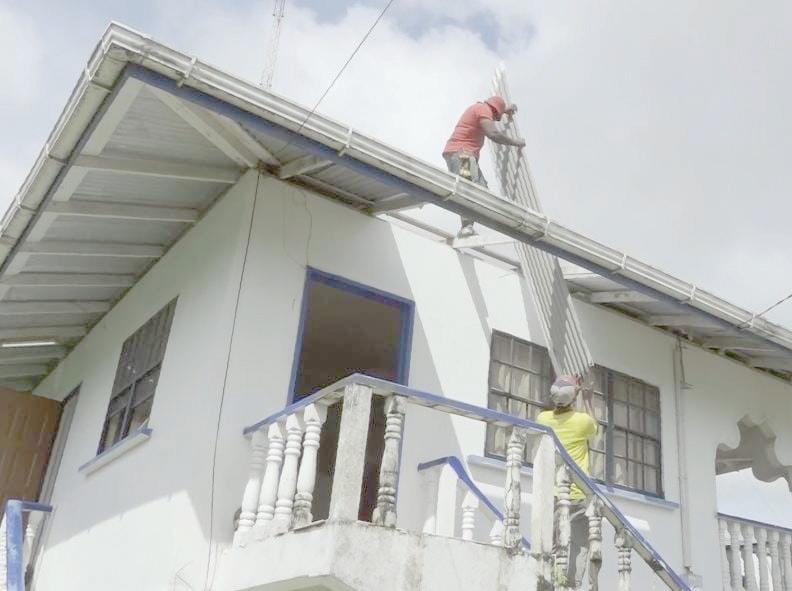
The government is partnering with local contractors and civil society organisations to expedite repairs and ensure that families can return to their homes as quickly as possible
of the way.”
The Minister described scenes of widespread flooding, where the loss of roofs left homes waterlogged and
uninhabitable. Fallen trees have added to the destruction, complicating recovery efforts for both families and local infrastructure.
The Civil Defence Commission (CDC) has been instrumental in the government’s response, conducting rapid assessments and delivering hot meals to families unable to cook due to water damage. Minister Edghill emphasised that the government remains committed to ensuring the safety and well-being of all those affected, pledging ongoing support to help families recover and rebuild.
“The government’s response is focused on ensuring that no family is left vulnerable,” Minister Edghill assured the people of Linden. “Losing a roof and enduring flooding is devastating, but we are committed to restoring your homes and providing continued support during this difficult time.”
The Minister further reiterated the People’s Pro -
gressive Party/Civic (PPP/C) Government’s dedication to restoring normalcy for the families in Linden. “We are working tirelessly to ensure that homes are repaired and that everyone has access to meals and essential services. The government will continue to stand in solidarity with the people of Linden as they rebuild their lives after this unfortunate event.”
In addition to immediate relief efforts, the government is partnering with local contractors and civil society organisations to expedite repairs and ensure that families can return to their homes as quickly as possible.
Recovery efforts are ongoing, with a continued focus on repairing roofs and restoring basic infrastructure across the affected areas.
THE Ethnic Relations Commission (ERC) has expressed deep concern over a video circulating online that shows a police officer interrupting a church service in Mabaruma, Region One.
The officer is seen escorting the church's musicians out of the premises and taking them to the police station over an alleged noise nuisance complaint.
The ERC strongly condemns any actions that vio-
late the constitutional right to Freedom of Worship, as outlined in the Constitution of the Co-operative Republic of Guyana. While the Commission acknowledges the Guyana Police Force's responsibility to address public complaints, it believes the situation could have been managed in a way that was less disruptive to the church service.
In accordance with Article 212D of the Constitution, the ERC reaffirmed its
commitment to promoting respect for religious, cultural, and other forms of diversity in Guyana’s plural society. The Commission has announced it will conduct a thorough investigation into the incident and work towards an amicable resolution for all parties involved.
The ERC also highlighted that many cases brought to its attention involve ethnic tensions linked to noise disturbances. As such, it

urges all citizens to remain respectful and considerate of one another by maintaining appropriate noise levels
within their communities.
The ERC concluded by calling for peaceful co-existence, emphasising that collective efforts are essential to fostering a society rooted in harmony and mutual respect.
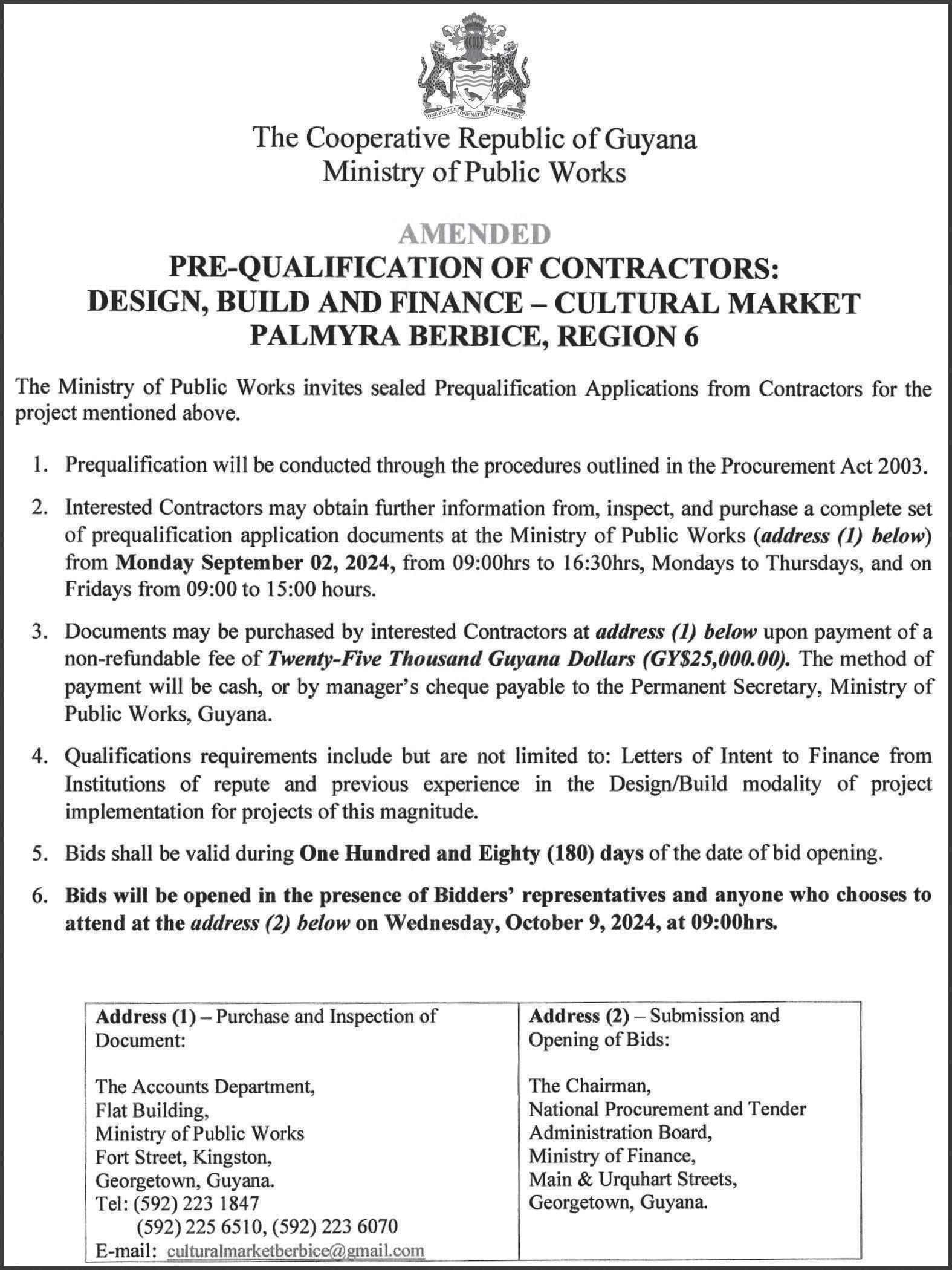
By Shaniya Harding
AS part of the Government of Guyana’s ongoing efforts to engage with citizens and foster community development, Minister of Labour Joseph Hamilton visited the Rupununi community of Annai on Monday.
His visit focused on the Bina Hill Institute and its surrounding areas, as he met with community leaders and assessed the progress of key infrastructure projects.
Accompanied by his technical team and Chief Executive Officer of the Board of Industrial Training (BIT), Richard Maughn, Minister Hamilton reviewed the $20 million infrastructural works being undertaken at the Bina Hill Institute.
These projects, which commenced in 2023, are aimed at creating a state-of-the-art technical and vocational training hub for the region.
The new facilities, including an Information Technol-
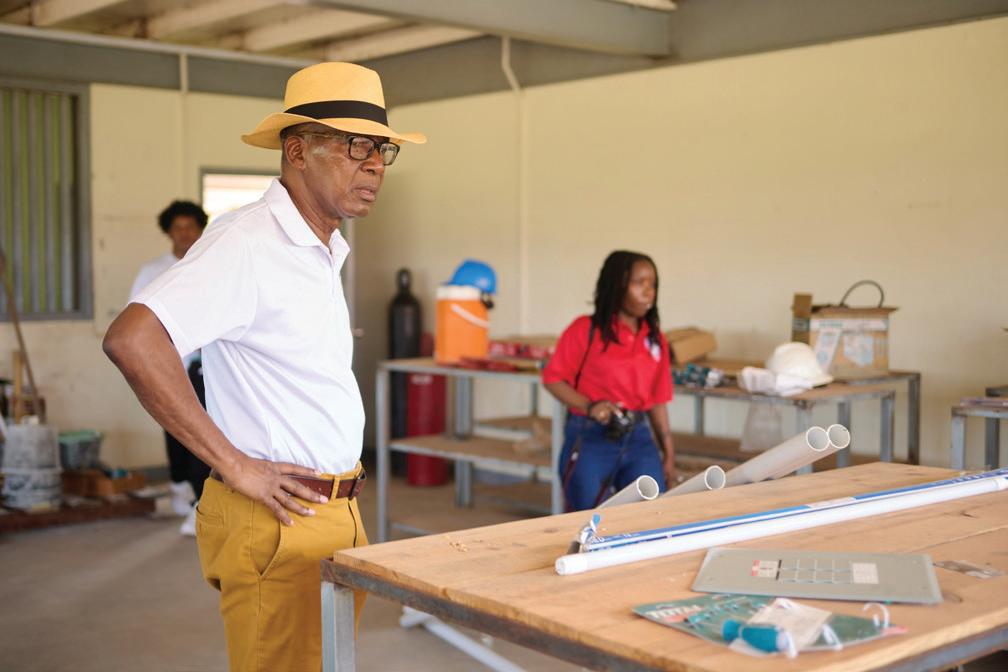
ogy Laboratory, Welding and Fabrication Centre, Joinery Workshop, and Culinary Centre, are being developed in accordance with Technical and Vocational Education and Training (TVET) standards.
The Minister’s visit followed the signing of a Memorandum of Understanding (MoU) in 2022 between BIT, the Bina Hill Institute, and the North Rupununi Development
Association. This partnership aims to enhance technical skills training and provide more job opportunities for residents of the region.
Empowering Local Talent for Community Growth
During his discussions with the North Rupununi District Development Board, Minister Hamilton highlighted the importance of engaging local leaders and artisans in train-
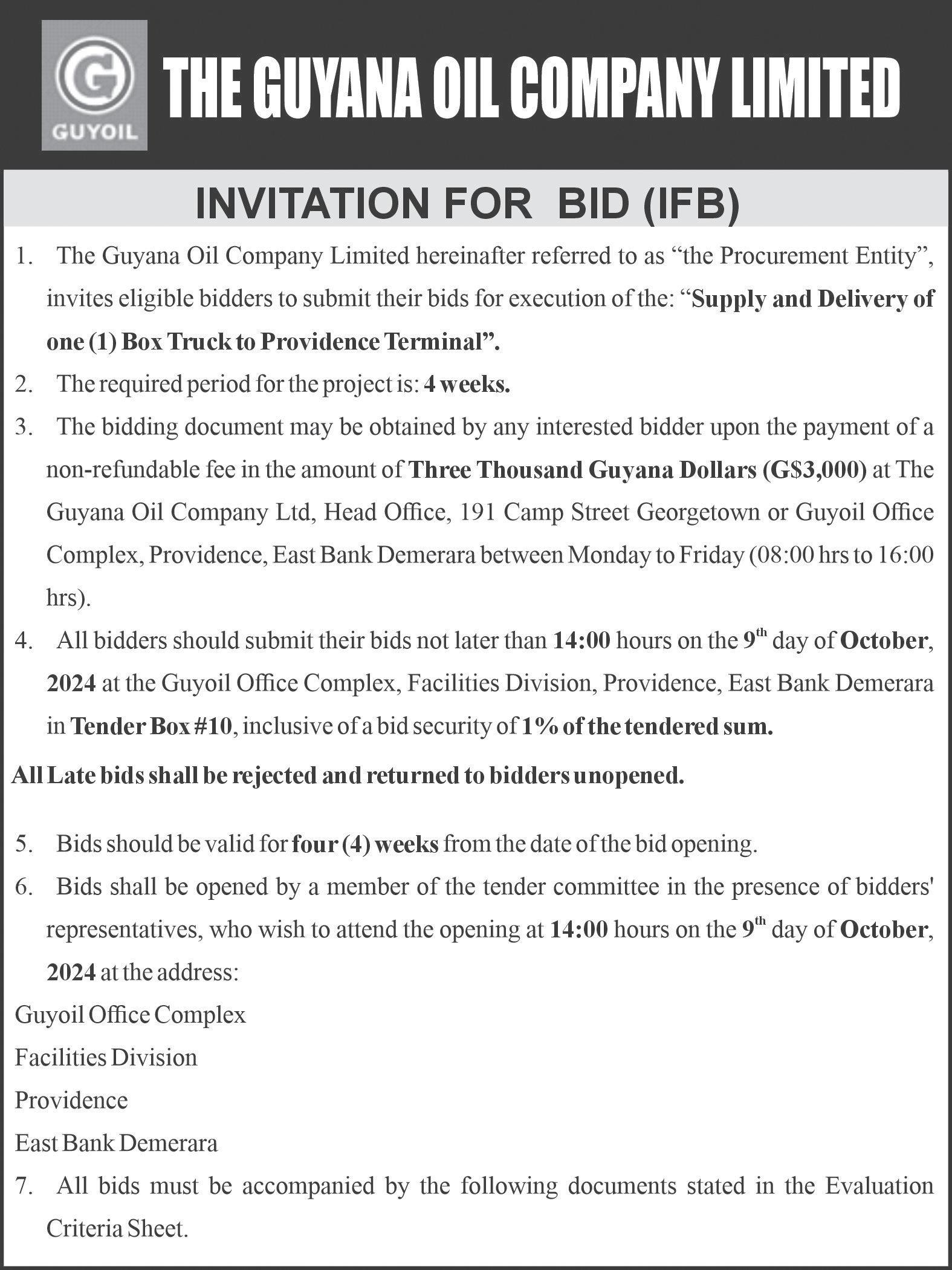
ing initiatives. He explored the possibility of recruiting skilled locals to fill teaching roles in programmes such as joinery, suggesting that a community-based approach could strengthen job creation efforts.
“So perhaps we can find a good joiner who can train young people to do furniture that are in consonance with the community,” Minister Hamilton proposed, underscoring the government's commitment to fostering self-sustainability through skills development.
He emphasised that all training programmes should have tangible outcomes that benefit the community, stating, “That’s the end product I want. Not just training for the sake of training, but training for an end product.”
Community Voices: Skills Training and Opportunities
The Minister’s visit also provided an opportunity for community members to share their perspectives on the impact of training programmes. Marlyn Browne, a resident
who had previously received training, praised the BIT initiatives and noted how they have positively impacted her village. “From my village, I can see. It was not just me alone from my village. Those persons who are trained here are working really hard,” she said.
However, Browne also pointed out areas for further improvement, suggesting that additional training in labeling and packaging could help enhance the community's output.
In response, Minister Hamilton reiterated the need for marketing skills alongside production capabilities, advising that successful entrepreneurs not only need to create quality products but also know how to effectively market them. “Because it’s one thing to make the thing, you know. You have to have the technique to market the product,” he advised.
Minister Hamilton’s visit concluded with a call for collaboration between local and
national entities to ensure the efficient use of newly added resources at the Bina Hill Institute. He stressed the need for co-operative efforts to ensure the long-term functionality of the new training facilities.
“This building now has added resources. How do we, together, make it functional? And that is the reason I’m here,” the Minister said, highlighting the government’s commitment to creating sustainable growth through community engagement.
The visit to Bina Hill Institute serves as a strong reminder of the administration’s focus on empowering local communities through skill-building initiatives, infrastructure development, and direct engagement with residents. By addressing the specific needs of the people and fostering collaboration, the government aims to create long-term opportunities for communities across Guyana, improving both the local economy and quality of life.
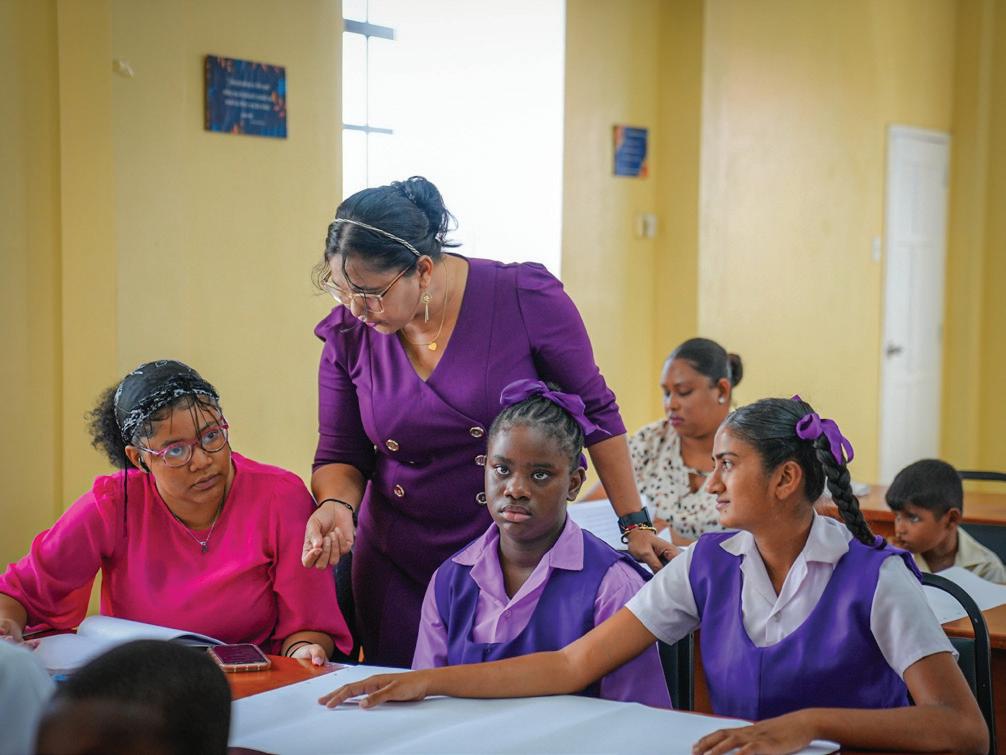
Region Three’s Education Department launched a groundbreaking four-day SEND training workshop, the first in the region
THE Regional Education Department of Region Three has launched a groundbreaking four-day Special Education Needs and Disabilities (SEND) training workshop, the first of its kind in the region. This initiative, a joint
effort between the Ministry of Education’s SEND Unit and the Guyana Council for Disabilities, aims to equip educators with the skills necessary to enhance learning outcomes for students with SEND.
Six SEND teachers and
several students are actively participating in the workshop, which focuses on critical areas of special education, including visual impairments, physical disabilities and learning disabilities. The training covers essential topics such as reading and writing Braille, managing behavioural challenges, and providing support to students with physical disabilities.
The workshop offers specialised instruction, enabling teachers to better understand the unique needs of SEND students and how to effectively identify and support them within classroom settings.
This first-of-its-kind initiative in Region Three is a significant step forward in advancing inclusive education in Guyana, highlighting the commitment to ensuring that all students, regardless of their disabilities, receive the support they need to succeed.



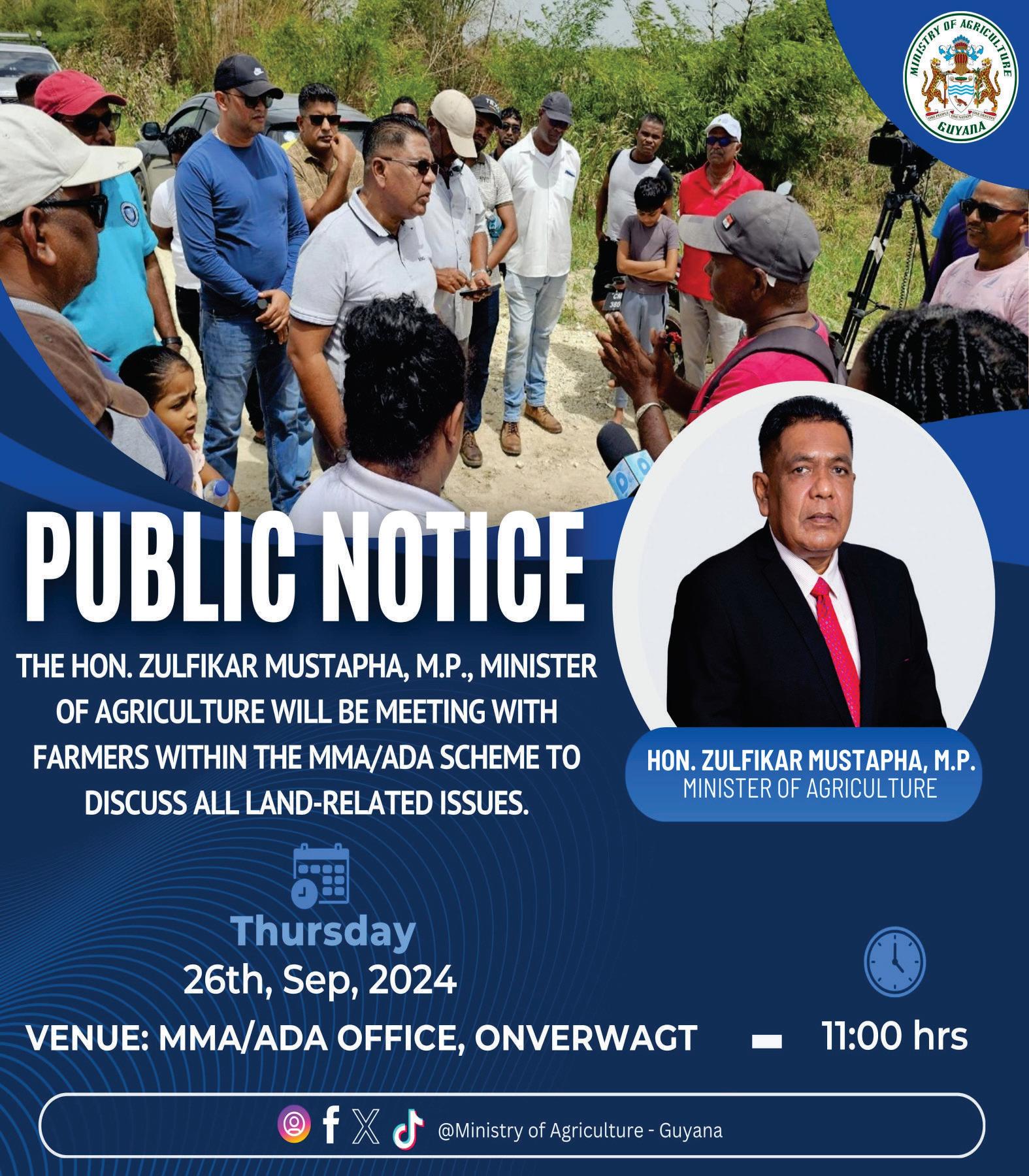
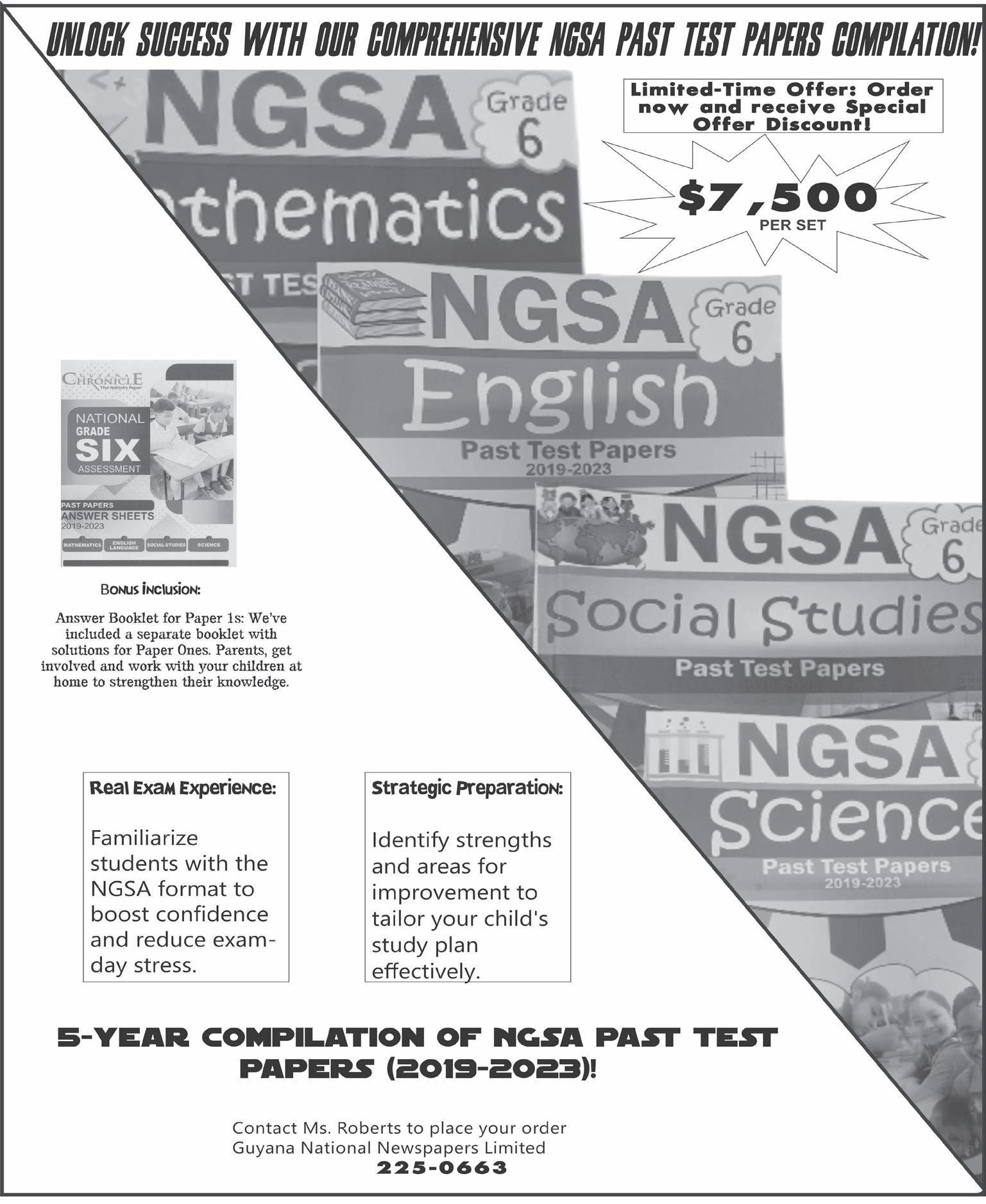










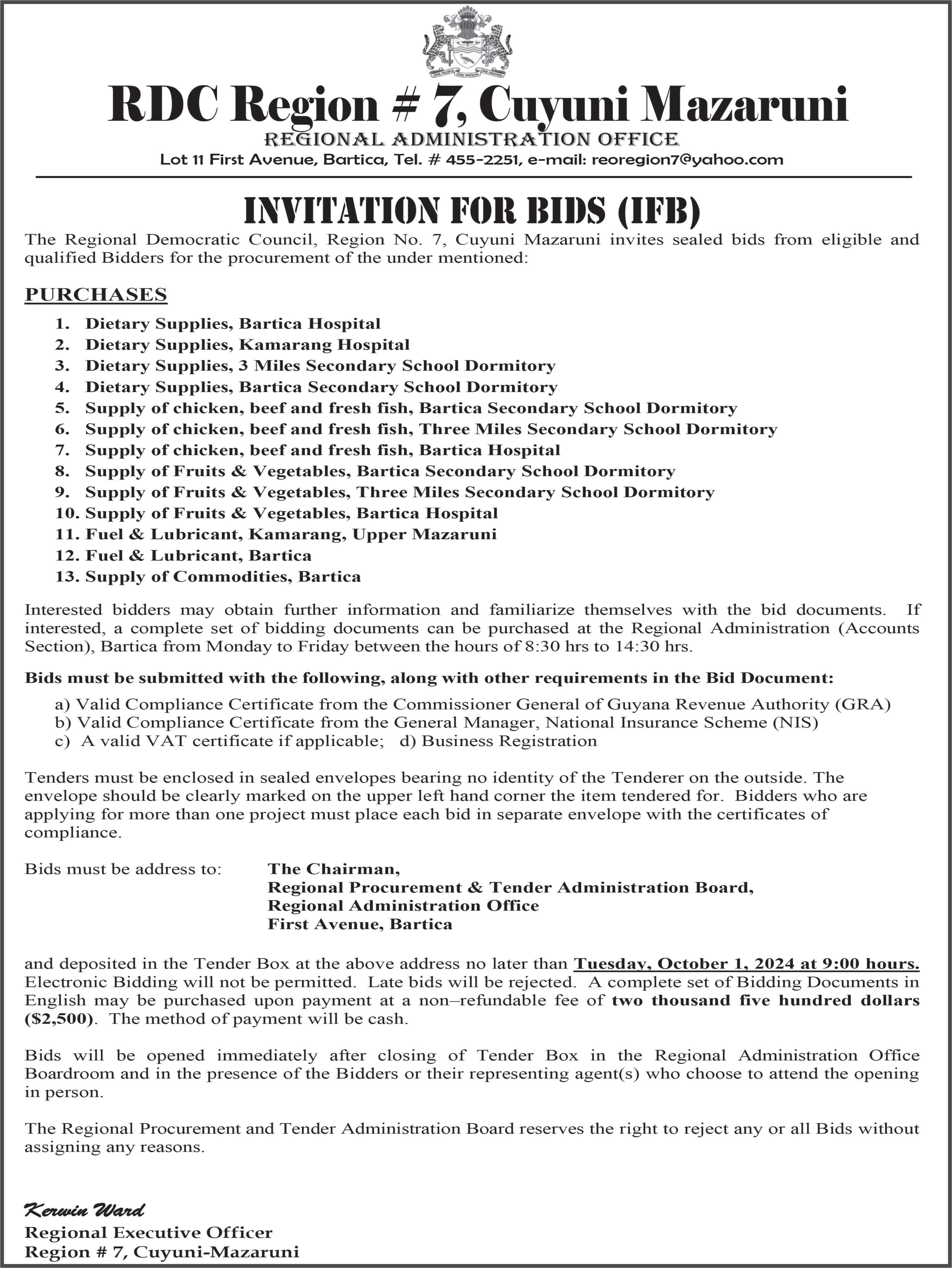




HOST Vergenoegen captured the best gym accolade while the club’s trainer, Clifton Moore, and Forgotten Youth Foundation’s (FYF) Shakquain
James secured the best coach and boxer awards, respectively, in the inaugural West Demerara leg of the Guyana Boxing Association's (GBA) U-16 Championship.
The West Demerara team walked away with the overall title at the Rice Mill tarmac following a record of three wins and a defeat.
Ezekiel Withwright defeated Teaka Narine of the Pocket Rocket Boxing Gym (PRBG) via decision in the 39-41Kg schoolboys cate -
gory.
Similarly, Jason Fileen bested Trendy Forde of (PRBG) in the 45-47Kg schoolboys encounter.
In the junior division, Keyon Britton defeated Isiah Nurse of RHJ in their 4850Kg encounter. Their only defeat occurred in the 34-36Kg schoolboys division, as Rayon France lost to Roopesh Balgobin of Rose Hall Jammers (RHJ) via a decision.
Meanwhile, James defeated Terron Wintz via decision in their 63.5-67Kg encounter in the Youth Division.
The acquisition of the new boxing ring, which was facilitated by the Ministry of
Culture, Youth, and Sport, allowed the GBA the opportunity to begin the decentralisation process of the sport with the staging of the event in the West Demerara region.
The annual initiative has formed the backbone of GBA’s nursery programme, and with the attainment of the new ring, will allow the association to utilise the older equipment to be transported to the various venues going forward.
Linden is slated to host the next initiative leg of the event. Similarly, Berbice is scheduled to take centre stage following the conclusion of the Linden date. Below is the complete list of results.
Schoolboys Division
20-22Kg
Eron Cornelius (Pace & Power) vs. Romario Stellingburg (Pace & Power) Cornelius won via decision
34-36Kg
Roopesh Balgobin (RHJ) vs. Rayon France (Vergenoegen)
Balgobin won via decision
39-41Kg
Ezekiel Withwright (Vergenoegen) vs. Teaka Narine (Pocket Rocket) Withwright won via decision
53-55Kg
Lennox Lawrence (ALBG) vs. Curtis McDonald (RHJ) Lawerence won via decision
45-47Kg
Jadon Fileen (Vergenoegen) vs. Trendy Forde (Pocket Rocket) Fileen won via decision
Junior Division
46-48Kg
Okenwa Bushel (RHJ) vs. Travis Cooke (Pocket Rocket) Bushel won via decision
48-50Kg
Keyon Britton (Vergenoegen) vs. Isiah Nurse (RHJ) Britton won via decision
Youth Division
63.5-67Kg
Shakquain James (FYF) vs. Terron Wintz (NABA) James won via decision
GSCL President, John, expressed profound gratitude to the representatives of Banks DIH for their support and promised that the tournament will definitely be exciting from ball one as several top softball players from Guyana and North America will be on show.
Team Guyana
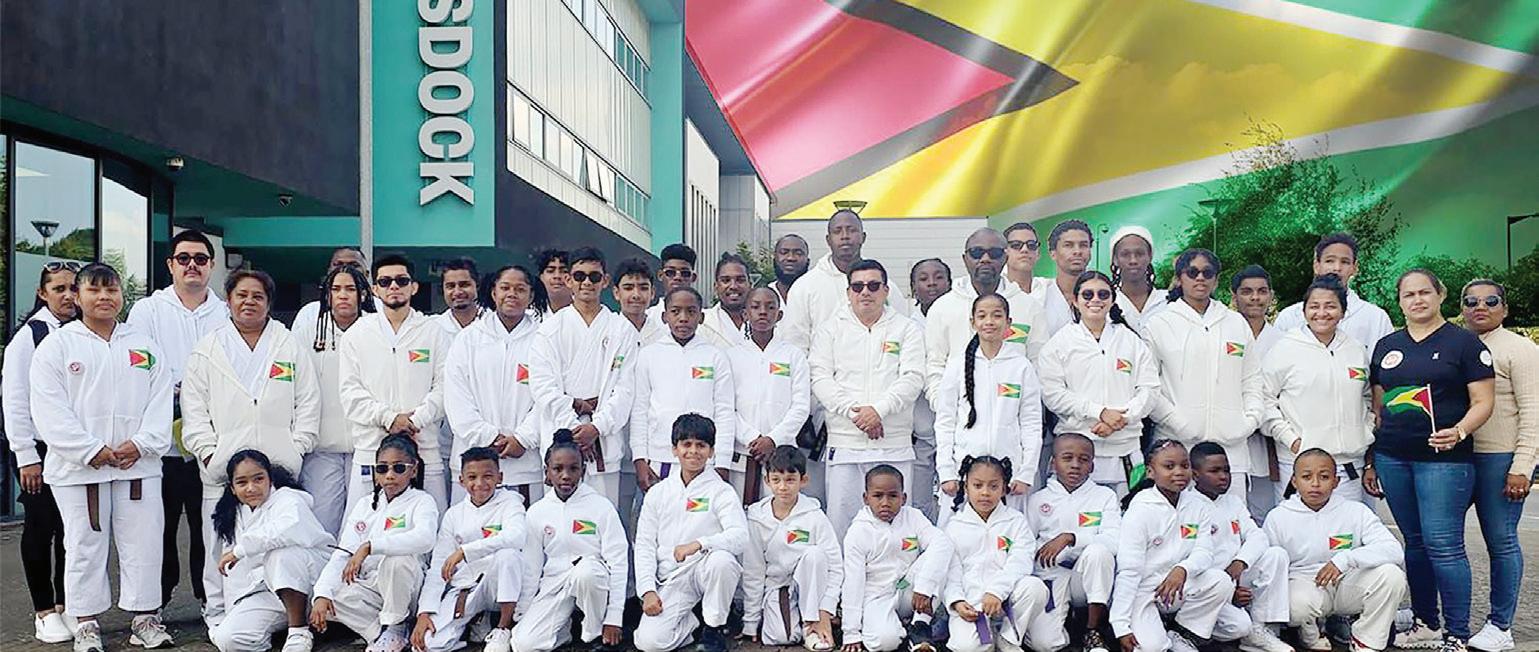
THE ISKF Team Guyana, accompanied by a delegation of 99 participants, parents, and supporters, has safely arrived in London.
The team is preparing for the ISKF 4th ShotoCup World Tournament, which will take place this weekend at the UEL SportsDock, University Way, Beckton, London.
Our athletes are acclimating to the local environment and undergoing intensive training sessions to ensure they are in peak condition for the competition. The tournament promises to be an exciting event, with territories from the USA, Pan America, Europe, Asia, the Middle East, and Africa in attendance. It’s a fantastic opportunity for our team to represent Guyana on this prestigious global stage and to engage in cultural exchange with participants from across the world.
The strong presence of our 99-member delegation underscores the communal spirit and enthusiasm that surrounds our athletes,
(From page 30)
Teams will compete in three male categories: Legends (Over-50), Masters (Over-40) and Open (AllStars) while there’s also a women’s division. The men will feature in 20-overs while the women will compete in 15-over affairs. Over $300,000,000 in
75 per cent pass rate...
instructors, and assessors, this workshop is instrumental to the success of our overall goals,” Peart stated.
Upon his return to Guyana, Peart plans to channel the knowledge gained at the workshop into elevating the standards of refereeing within the GFF. “I will utilise
prize money will be up for grabs plus several incentive prizes in all the various categories.
The tournament is organised in collaboration with the Office of the Prime Minister and the Ministry of Culture, Youth and Sport.
(From page 30)
the knowledge to empower and elevate the standards of our refereeing,” he affirmed. Peart’s leadership in this initiative aligns with the GFF’s broader goals of continuous improvement and capacity building within all levels of football officiating. With ongoing efforts to
maintain physical readiness and enhance professional skills, the GFF referees are positioning themselves to not only meet FIFA’s stringent criteria but also to make significant contributions to football’s growth in Guyana and the region.

AMERICAN RACING TIPS
BELMONT
Race 1 Stunner
Race 2 Foxy Cars
Race 3 Daybright Delights
Race 4 Quick Power Nap Race 5 Sendera Race 6 Moonsge Daydream Race 7 Full Screen
showcasing the solidarity and pride of our nation. We are confident that our team will demonstrate the skill and discipline that karate demands, bringing honour to Guyana.
We invite you to join us in following their journey and cheering them on as they strive for excellence.
We will keep you updated on their progress and achievements throughout the tournament.
Thank you for your continued support and coverage, which play a crucial role in highlighting the spirit of sportsmanship and excellence at an international level.
(Thursday, September 26, 2024)
COMPLIMENTS OF CUMMINGS ELECTRICAL COMPANY LTD 83 Garnett Street, Campbellville, Georgetown (Tel: 225-6158)
Answers to yesterday’s quiz: (1) Evin Lewis (Patriots) – 31 sixes
(2) Jonathan Foo & Rovman Powell (Tallawahs – 9 catches each)
Today’s Quiz: (1) Who is the first player to lead the GAW in a CPL game?
(2) How many players have captained the GAW in CPL games to date?
Answers in tomorrow’s issue
SOUTH AFRICA RACING TIPS VAAL 08:45 hrs Far Reaching 09:20 hrs Americsn Rebel 09:55 hrs Ice Star 10:30 hrs Royal Horizon ENGLISH RACING TIPS
hrs Naval Command
hrs Celeborn 09:45 hrs Funny Story
hrs Monumental 10:55 hrs Al Nayyir 11:30 hrs Baltic 12:05 hrs Amsterdam
PONTEFRACT 09:00 hrs Alafdhal 09:35 hrs Datk Rosa 10:10 hrs Mr Monaco 10:45 hrs Hot Dancer 11:20 hrs Ghost Story 11:53 hrs Top Juggler 12:53 hrs Fiscal Policy
SOUTHWELL 11:25 hrs Miakoda
IRISH RACING TIPS LISTOWEL 09:20 hrs Sansrisk 09:55 hrs Downmexicoway 10:30 hrs Eagle's Reign 11:05 hrs Ifitwasme 11:37 hrs Great Universe 12:10 hrs Mossy Fen Park
12:45 hrs Goldinthevalleys
YESTERDAY, at a simple but very important ceremony, the Georgetown Cricket Club (GCC) collaborated with Kentucky Fried Chicken (KFC) to launch the KFC Mini Zinger Cricket programme at the Bourda Cricket Ground pavilion.
The cricket programme is similar to the one held by the late Desmond Watkins (Watto) in the 1980s and will start with 50 boys and girls from to five to eleven years from primary schools.
The programme will be held on Saturday mornings from 8 to 9:30 hours and begins on October 5.
Coaching will be conducted by GCC’s Head Coach, former Guyana youth opener, Peter Persaud and Guyana Harpy Eagles Assistant Coach, former Guyana off-spinner Garvin Nedd.
GCC’s President Johnaton Yearwood thanked KFC
for joining forces with the oldest Cricket Club in the West Indies to create a devolmental programme for pre-teen children interested in becoming cricketers.
“Since I became president, I was told to think big. When we had our Academy in August, we approached KFC for sponsorship but they wanted to be the overall sponsor but we had already had sponsors. We always wanted to have a programme where children can come on Saturday mornings to learn the various skills needed the to be an outstanding cricketer,” the GCC boss said.
“The participants could decide if they want to play cricket as a career. This programme would also assist in producing cricketers for other clubs, since they are free to join other clubs as they get older and improve. We approached KFC who, without hesitation, came on board.” the proactive Year-
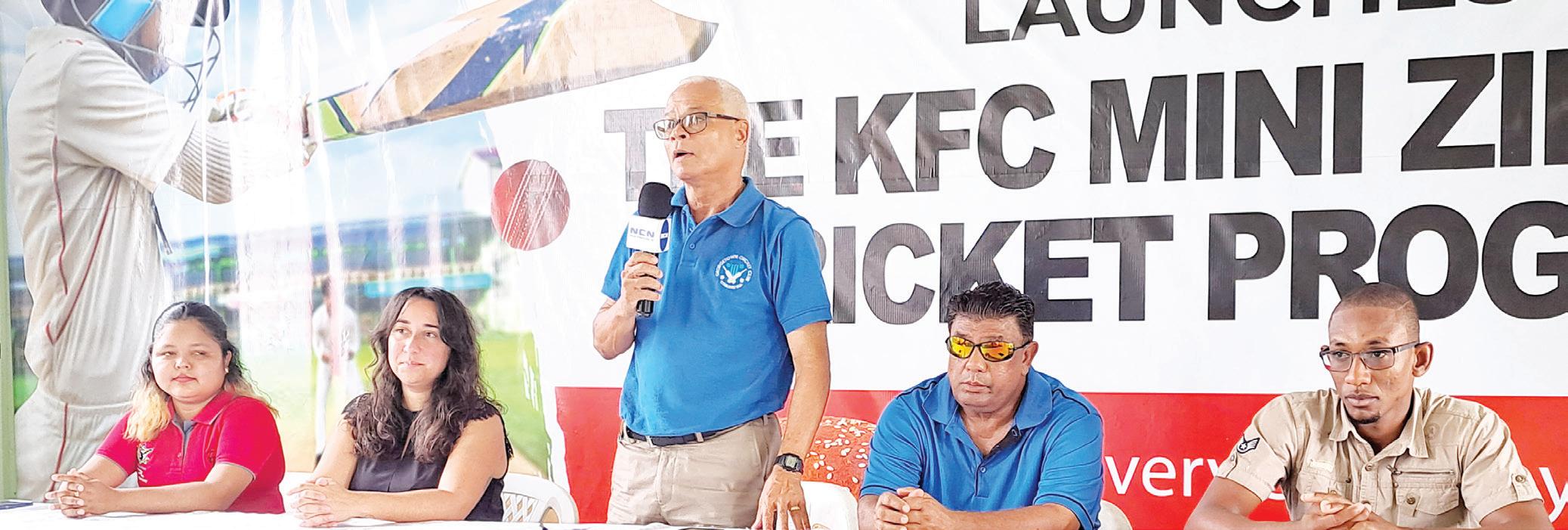
wood disclosed.
There is no registration fee.
“My ultimate hope is that we can produce 11 GCC players on the West Indies team. This year we had seven players on Guyana U-19 team,” continued Yearwood who played Hockey for President’s X1.
GCC now shares the
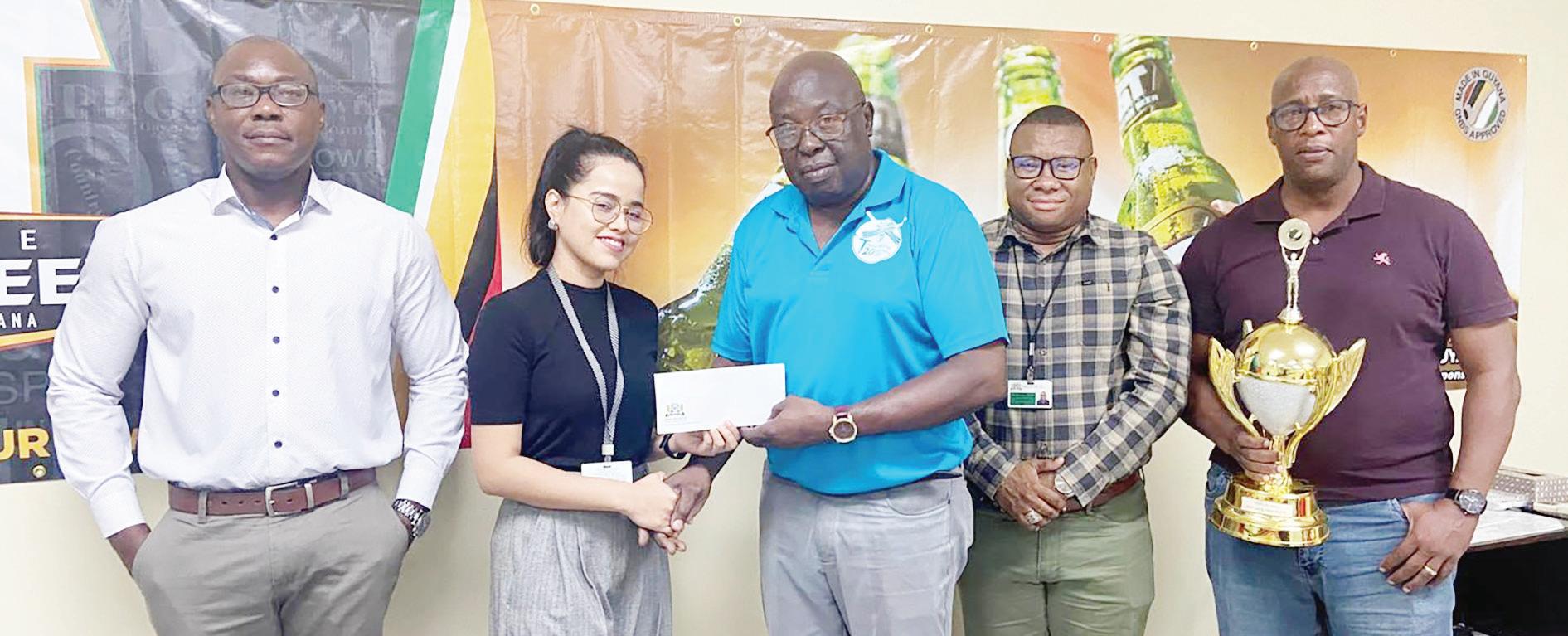
BEVERAGE giants, Banks DIH, through its GT Beer, has thrown its support behind the staging of the eighth annual Prime Minister’s Softball Tournament, set to bowl off on October 11.
At a simple, but significant ceremony, held at its Thirst Park headquarters yesterday (Wednesday), Triskits Pinechill Brand Manager, Shenisa Fredericks handed over the sponsorship cheque to
Georgetown Softball Cricket League (GSCL) President Ian John in the presence of other officials of the company.
According to Brand Manager, Dwaine Bristol, Banks DIH was extremely happy to support the threeday extravaganza, set for October 11-13.
“We [are] glad to be given the opportunity by the League to showcase our GT Beer at this huge softball tournament and certainly
happy to support a huge softball tournament like this one,” Bristol disclosed. Water Beverage Manager, Colin King, shared similar sentiments and was also delighted that his company will be associated with softball cricket. King further disclosed that Banks DIH will supply the water for all the teams during the three days of competition and assured that the same will be done in 2025.
(Turn to page 29)
record with Malteenoes who achieved the feat in 1987.
Some of those players started at the GCC ‘nursery’ under Watto who died in 2006 and is honoured with his name being on the home team’s dressing room.
Marketing Director of KFC (Guy) Sadia Strand said that KFC was delighted to assist with the funding of
this programme since she knows how big cricket is here.
“We support sports in all of the Countries that we have KFC Franchises and we commit to this program on a long-term venture. We will love to be involved with the nursery of the further international stars,” posited the KFC official.
Coach Persaud also gave brief remarks.
KFC was founded by Coronel Harland Sanders and opened its first Franchise in Utah in 1952 while Bourda was opened in 1884 and staged its first Test match in 1930 when West Indies recorded its first Test win, beating England by 89 runs.
75 per cent pass rate recorded as
A 75 per cent pass rate was recorded as 20 referees from the Guyana Football Federation (GFF), including eight females, recently participated in a rigorous fitness test, a critical step in meeting FIFA’s nomination criteria for 2025. The test, aimed at assessing physical endurance and agility, forms part of the international body’s requirements for referees aspiring to achieve FIFA certification.
Conducted in alignment with FIFA's standards, the fitness test saw a strong participation rate, with the referees demonstrating their dedication to meeting international benchmarks. According to Lenval Peart, the GFF’s Head Referee, the test is more than just a requirement— it's a reflection of the referees' commitment to maintaining top-tier fitness levels throughout the year.
“The fitness test is part of FIFA’s criteria, which is essential for the 2025 nomination for referees,” Peart shared. He emphasised that this test is not a one-off occur-
rence but part of a consistent regimen to ensure referees are in peak physical condition.
“This test is mandatory and happens at least three times per year, with random fitness checks. We have a 75 per cent pass rate,” he added. He added that the high participation—especially among female referees— reflects the GFF's drive toward inclusive development within the sport.
In tandem with the fitness test, Peart has embarked on a vital refereeing workshop in Trinidad, hosted by CONCACAF, to foster knowledge exchange and strengthen the region’s officiating standards.
Taking place from 24 to 26 September 2024, the workshop serves as a crucial platform for capacity building and professional development. Peart expressed his enthusiasm for the opportunity, underscoring the workshop’s importance for his professional growth and the development of refereeing in Guyana.
“I am immensely enthusiastic about this workshop; it's a fresh initiative from
CONCACAF, and it's always gratifying to be a part of history,” Peart remarked. The workshop will focus on exchanging crucial insights and information that will empower Member Associations to lead their refereeing departments with renewed vigour and purpose in the coming years.
“I intend to acquire crucial insights and information from the heads of referees from other Member Associations, who have been in positions of authority for longer than I have,” Peart noted, highlighting the learning opportunities he aims to capitalise on.
Peart also stressed the broader strategy behind this initiative, explaining the vital role of referees in the success of the sport. “This head of refereeing workshop represents a vital component of our broader strategy to elevate refereeing standards across our region. As the individual responsible for overseeing the training, education, and development of referees,
(Turn to page 29)
GUYANA’S Women’s Hockey team continued to punch above their Weight class in the Pan American Hockey Challenges Series holding the hosts Bermuda to a draw.
It was a heated encounter on Tuesday as Guyana picked up two yellow and two green cards in a tough period of play as they sought to defend their early gains.
It was Sarah Klautky that put them ahead with a penalty corner in the first
nandes said after the matchup that it was not was expected, he felt a win was on the cards.
“It was not a loss but I think this match was my most disappointing for the tournament, simply because I think we have a team that should be superior to Bermuda, simply because we have better athletes and I think we are capable of playing better, we didn’t have our best game.”
Fernandes noted that

quarter as they took the lead.
Bermuda’s Georgia Harris showed her class to equalise for Bermuda on the verge of the half as the two sides battled for a chance to reach the final.
The result sees Guyana hold onto the second spot on the five teams table with a win and two draws from three outings behind leader and pre-tournament favourites Mexico who are 2 for 2.
Guyana will face the Mexicans on Friday in an all-important clash to decide the team moving into the final.
Mexico is the strongest side in the tournament ranked 37 in the world compared to Guyana’s ranked 68th in the world.
On Sunday, Guyana clashed with Paraguay and eke out a draw, the nation lone victory came against Brazil in their opener which they won 1-nil compliment of 14 year’s old Makaylah Poole goal.
Head coach Phillip Fer-
based on the run of play it was their game to win.
“We started off well and we went up by a goal and we were comfortably in charge and then we started to lose concentration a bit and we let them back into the game, even though their chances were just hits into our area, looking or a deflection, we had more penetrating runs in that first half, they managed to pull a goal back in that period.”
The coach said the second half saw less than ideal play form the Guyanese which cost them in the end.
“When the second half started, we were playing with a lot of penalty cards, putting players off, some were warranted, but some were a bit puzzling but we spent maybe half of the second half, playing a player down and that threw out rhythm and tactics off because we had to adjust to a more defensive style.”
He said they would have preferred to face Mexico in a
more advantageous position which would have given them more freedom to play but they will have to stepup their game in their final
group clash.
Guyana is seeking to qualify for the Pan American Hockey Federation (PAHF) Cup scheduled for
Uruguay in 2025 and the Hockey World Cup next year.
Guyana last competed in the PAHF Challenge back
in 2011, where they finished runners-up to Uruguay in Rio de Janeiro, Brazil.
The challenge series runs until September 28.



of Guyana Amazon Warriors hits a six and Quinton de Kock

THE Guyana Amazon Warriors continued their winning streak at home with a 47-run drubbing of the Barbados Royals last evening at the Providence National Stadium.
Fans turned out in their numbers to witness the defending champions and were treated to a
spectacle when hometown hero Shimron Hetmyer 57 (34) and Shai Hope 71 (37) were the chief destructors with the bat.
The duo along with Azam Khan 26 (17) and Romario Shepherd 23 (13) carried the score to a handsome 219/8 off the allotted 20.
When they returned to bowl, Gudakesh Motie (3-42) alongside fellow spinners Moen Ali (2-16 ) and skipper Imran Tahir (2-22) ripped through the Royals lineup. Despite a late surge by David Miller 71*(43), the Royals ended at 172/9
Details in tomorrow’s edition
